Olympic boxer Imane Khelif calls for end to bullying after backlash over gender misconceptions
kaddour habbari and greg beacham
Sun, Aug 4, 2024
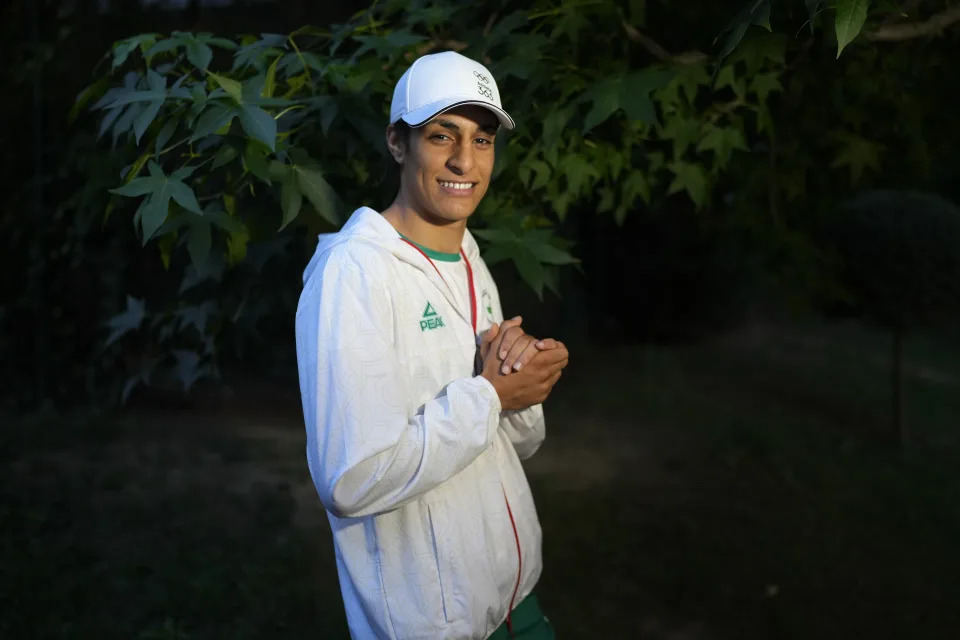
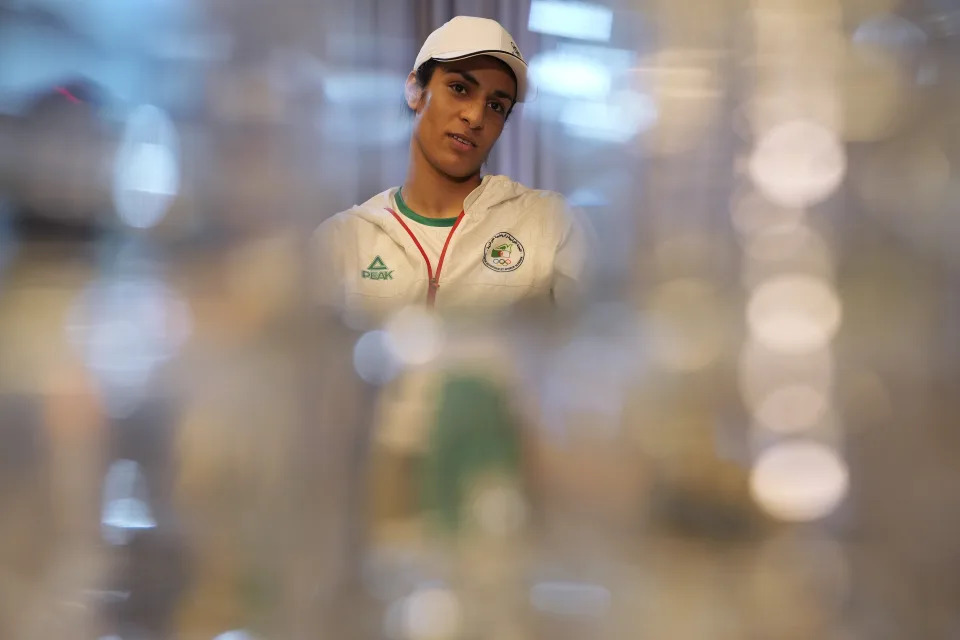
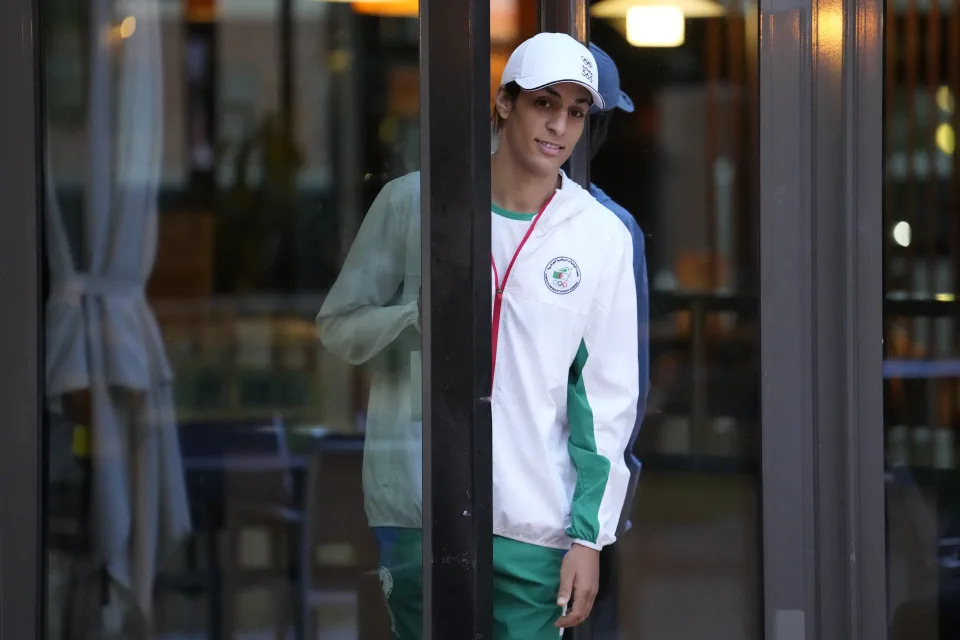
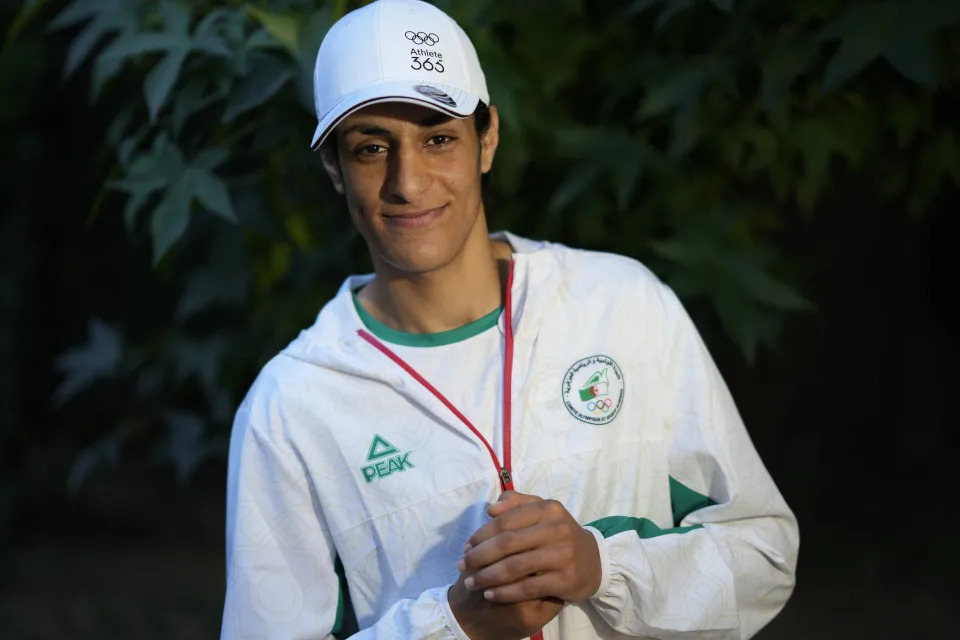


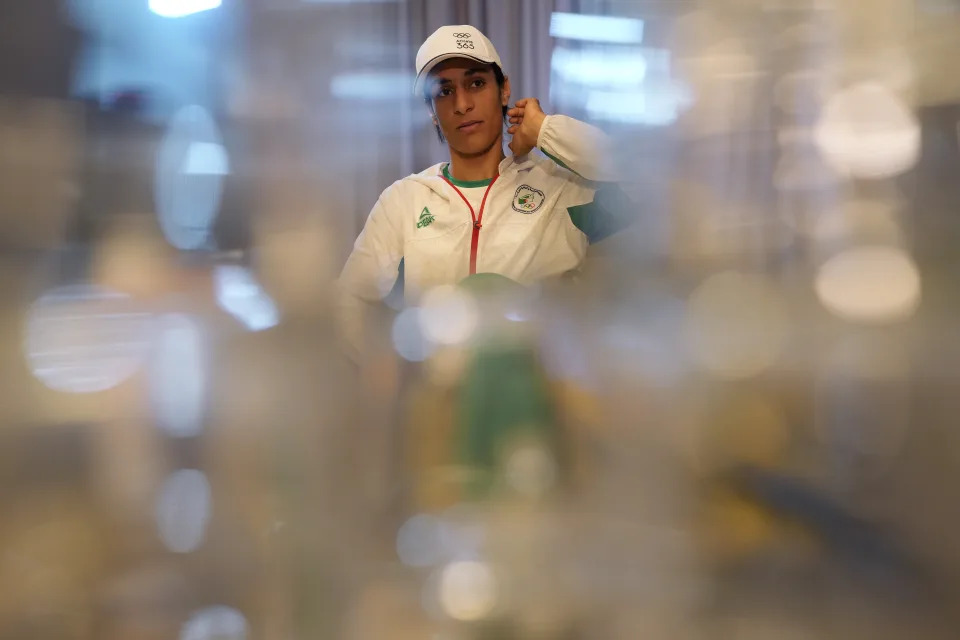
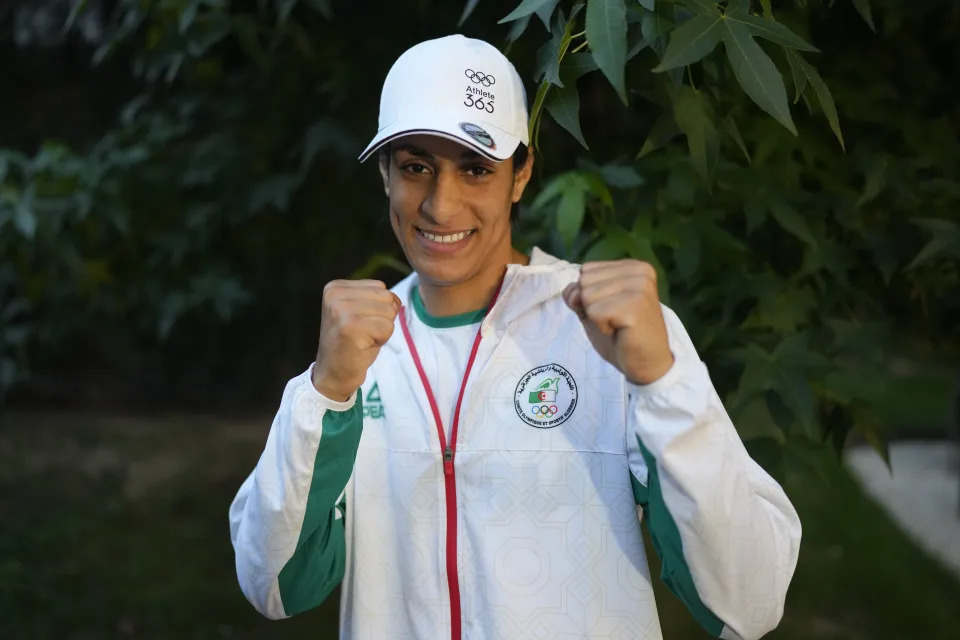
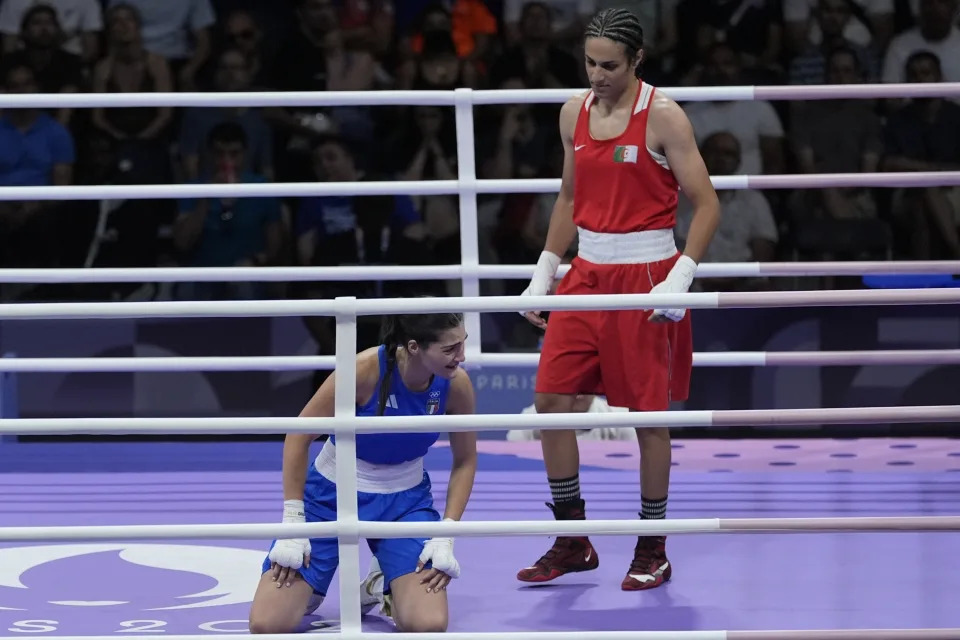
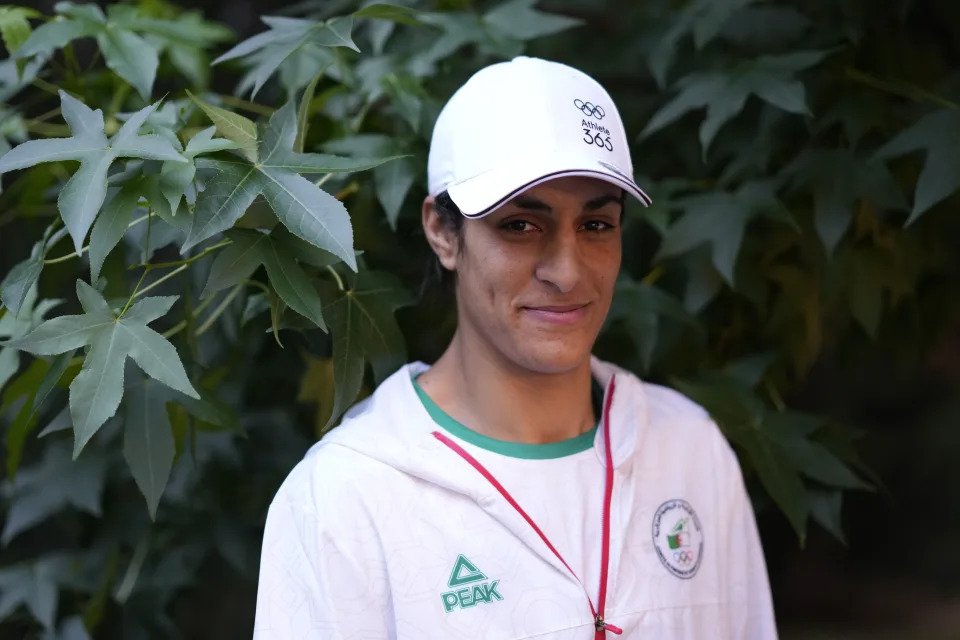
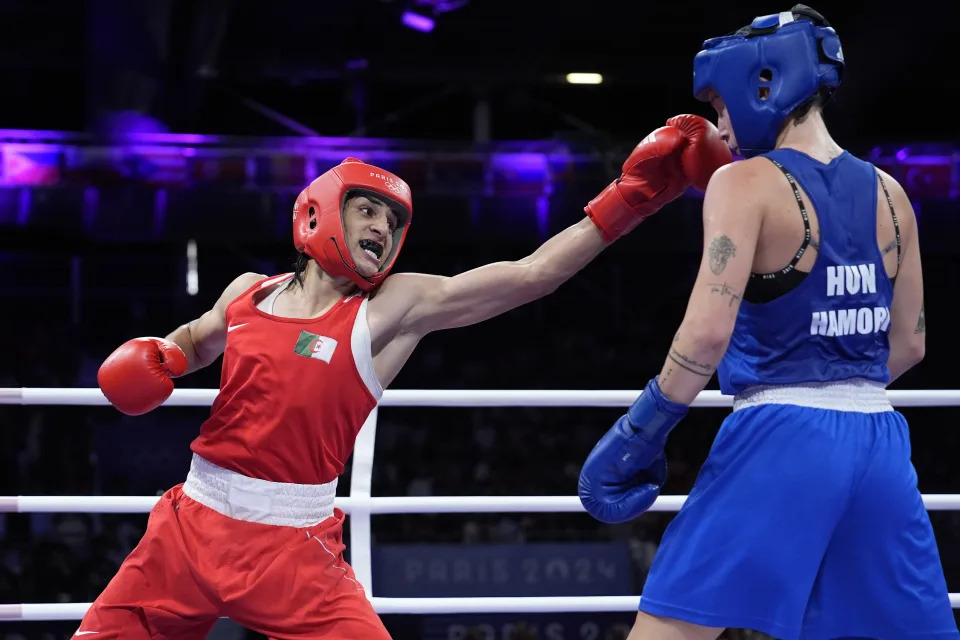

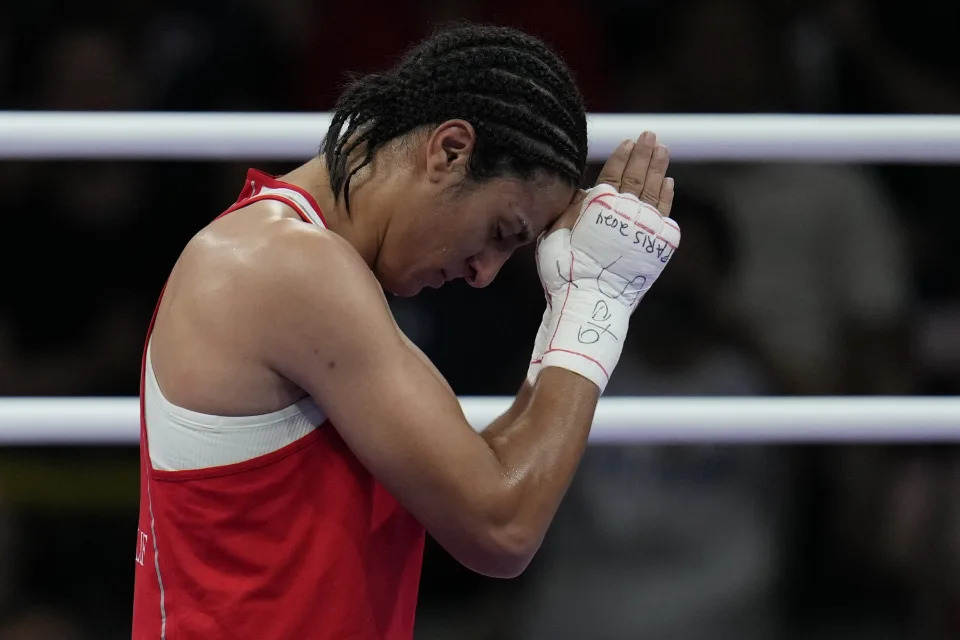
Algerian boxer Imane Khelif speaks during an interview with SNTV at the 2024 Summer Olympics, Sunday, Aug. 4, 2024, in Paris, France. (AP Photo/Vadim Ghirda)
PARIS (AP) — Olympic boxer Imane Khelif said the wave of hateful scrutiny she has faced over misconceptions about her gender “harms human dignity,” and she called for an end to bullying athletes after being greatly affected by the international backlash against her.
The Algerian athlete spoke about her tumultuous Olympic experience on Sunday night in an interview with SNTV, a sports video partner of The Associated Press.
“I send a message to all the people of the world to uphold the Olympic principles and the Olympic Charter, to refrain from bullying all athletes, because this has effects, massive effects,” Khelif said in Arabic. "It can destroy people, it can kill people’s thoughts, spirit and mind. It can divide people. And because of that, I ask them to refrain from bullying.”
The victories of Khelif and fellow boxer Lin Yu-ting of Taiwan in the ring in Paris have become one of the biggest stories of the Paris Games. Both women have clinched their first Olympic medals even as they have faced online abuse based on unsubstantiated claims about their gender, drawing them into a wider divide over changing attitudes toward gender identity and regulations in sports.
The 25-year-old Khelif acknowledged the pressure and pain of enduring this ordeal while competing far from home in the most important event of her athletic career.
“I am in contact with my family two days a week. I hope that they weren’t affected deeply,” she said. “They are worried about me. God willing, this crisis will culminate in a gold medal, and that would be the best response.”
The vitriol stems from claims by the International Boxing Association, which has been permanently banned from the Olympics, that both Khelif and Lin failed unspecified eligibility tests for the women’s competition at last year’s world championships.
Khelif declined to answer when asked whether she had undergone tests other than doping tests, saying she didn’t want to talk about it.
She expressed gratitude to the International Olympic Committee and its president, Thomas Bach, for standing resolutely behind her while the banned former governing body of Olympic boxing stoked a furor around her participation in Paris.
“I know that the Olympic Committee has done me justice, and I am happy with this remedy because it shows the truth,” she said.
She also has seen massive support at her bouts, drawing cheers when she enters the arena and crowds waving Algerian flags chanting her first name. She will fight again Tuesday in the women's 66-kilogram semifinals at Roland Garros.
Khelif repeatedly made clear she won't allow chatter or accusations to deter her from attempting to claim Algeria's first Olympic gold medal in women's boxing.
“I don’t care about anyone’s opinion,” Khelif said a day after beating Anna Luca Hamori of Hungary. “I came here for a medal, and to compete for a medal. I will certainly be competing to improve (and) be better, and God willing, I will improve, like every other athlete.”
Although she is aware of the worldwide discussion about her, Khelif said she has been somewhat removed.
“Honestly, I don’t follow social media," she said. “There is a mental health team that doesn’t let us follow social media, especially in the Olympic Games, whether me or other athletes. I’m here to compete and get a good result.”
Khelif started her Olympic run last Thursday with a victory over Angela Carini of Italy, who abandoned the bout after just 46 seconds. Carini later said she regretted her decision and wished to apologize to Khelif.
That unusual ending raised the chatter around Khelif into a roar, drawing comments from the likes of former U.S. President Donald Trump, “Harry Potter” writer J.K. Rowling and others falsely claiming Khelif was a man or transgender.
The IOC repeatedly declared her and Lin qualified to participate in the Olympics, and it has decried the murky testing standards and untransparent governance of the IBA, which was banished entirely from the Olympics last year in an unprecedented punishment for a governing body.
Khelif clearly felt the weight of the worldwide scrutiny upon her, and her victory over Hamori on Saturday appeared to be cathartic. After the referee raised Khelif's hand with the win, she went to the center of the ring, waved to her fans, knelt and slammed her palm on the canvas, her smile turning to tears.
“I couldn’t control my nerves," Khelif said in the interview. "Because after the media frenzy and after the victory, there was a mix of joy and at the same time, I was greatly affected, because honestly, it wasn’t an easy thing to go through at all. It was something that harms human dignity.”
She had competed in IBA events for several years without problems until she was abruptly suspended from last year's world championships. The Russian-dominated body — which has faced years of clashes with the IOC — has refused to provide any information about the tests.
Algeria’s national boxing federation is still an IBA member.
Khelif is from rural northwestern Algeria, and she grew up playing soccer until she fell in love with boxing. Overcoming her father’s initial objections, she traveled 10 kilometers (about 6 miles) by bus to train for fights in a neighboring town.
After reaching the sport’s top level in her late teens, she struggled early in her career before reaching an elite level. Khelif has been a solid, if unspectacular, international competitor for six years, and she lost to eventual gold medalist Kellie Harrington of Ireland at the Tokyo Olympics.
Khelif’s next bout in Paris is against Janjaem Suwannapheng of Thailand. If Khelif wins again, she will fight for a gold medal Friday.
“Yes, this issue involves the dignity and honor of every woman and female,” she told an Algerian broadcaster in brief remarks Sunday after beating Hamori. “The Arab population has known me for years and has seen me box in the IBA that wronged me (and) treated me unfairly, but I have God on my side.”
___
Habbari is an SNTV videojournalist. SNTV videojournalist Tarek Boussaha and AP videojournalist Lujain Jo contributed from Paris.
___
kaddour habbari and greg beacham
Sun, Aug 4, 2024













Algerian boxer Imane Khelif speaks during an interview with SNTV at the 2024 Summer Olympics, Sunday, Aug. 4, 2024, in Paris, France. (AP Photo/Vadim Ghirda)
PARIS (AP) — Olympic boxer Imane Khelif said the wave of hateful scrutiny she has faced over misconceptions about her gender “harms human dignity,” and she called for an end to bullying athletes after being greatly affected by the international backlash against her.
The Algerian athlete spoke about her tumultuous Olympic experience on Sunday night in an interview with SNTV, a sports video partner of The Associated Press.
“I send a message to all the people of the world to uphold the Olympic principles and the Olympic Charter, to refrain from bullying all athletes, because this has effects, massive effects,” Khelif said in Arabic. "It can destroy people, it can kill people’s thoughts, spirit and mind. It can divide people. And because of that, I ask them to refrain from bullying.”
The victories of Khelif and fellow boxer Lin Yu-ting of Taiwan in the ring in Paris have become one of the biggest stories of the Paris Games. Both women have clinched their first Olympic medals even as they have faced online abuse based on unsubstantiated claims about their gender, drawing them into a wider divide over changing attitudes toward gender identity and regulations in sports.
The 25-year-old Khelif acknowledged the pressure and pain of enduring this ordeal while competing far from home in the most important event of her athletic career.
“I am in contact with my family two days a week. I hope that they weren’t affected deeply,” she said. “They are worried about me. God willing, this crisis will culminate in a gold medal, and that would be the best response.”
The vitriol stems from claims by the International Boxing Association, which has been permanently banned from the Olympics, that both Khelif and Lin failed unspecified eligibility tests for the women’s competition at last year’s world championships.
Khelif declined to answer when asked whether she had undergone tests other than doping tests, saying she didn’t want to talk about it.
She expressed gratitude to the International Olympic Committee and its president, Thomas Bach, for standing resolutely behind her while the banned former governing body of Olympic boxing stoked a furor around her participation in Paris.
“I know that the Olympic Committee has done me justice, and I am happy with this remedy because it shows the truth,” she said.
She also has seen massive support at her bouts, drawing cheers when she enters the arena and crowds waving Algerian flags chanting her first name. She will fight again Tuesday in the women's 66-kilogram semifinals at Roland Garros.
Khelif repeatedly made clear she won't allow chatter or accusations to deter her from attempting to claim Algeria's first Olympic gold medal in women's boxing.
“I don’t care about anyone’s opinion,” Khelif said a day after beating Anna Luca Hamori of Hungary. “I came here for a medal, and to compete for a medal. I will certainly be competing to improve (and) be better, and God willing, I will improve, like every other athlete.”
Although she is aware of the worldwide discussion about her, Khelif said she has been somewhat removed.
“Honestly, I don’t follow social media," she said. “There is a mental health team that doesn’t let us follow social media, especially in the Olympic Games, whether me or other athletes. I’m here to compete and get a good result.”
Khelif started her Olympic run last Thursday with a victory over Angela Carini of Italy, who abandoned the bout after just 46 seconds. Carini later said she regretted her decision and wished to apologize to Khelif.
That unusual ending raised the chatter around Khelif into a roar, drawing comments from the likes of former U.S. President Donald Trump, “Harry Potter” writer J.K. Rowling and others falsely claiming Khelif was a man or transgender.
The IOC repeatedly declared her and Lin qualified to participate in the Olympics, and it has decried the murky testing standards and untransparent governance of the IBA, which was banished entirely from the Olympics last year in an unprecedented punishment for a governing body.
Khelif clearly felt the weight of the worldwide scrutiny upon her, and her victory over Hamori on Saturday appeared to be cathartic. After the referee raised Khelif's hand with the win, she went to the center of the ring, waved to her fans, knelt and slammed her palm on the canvas, her smile turning to tears.
“I couldn’t control my nerves," Khelif said in the interview. "Because after the media frenzy and after the victory, there was a mix of joy and at the same time, I was greatly affected, because honestly, it wasn’t an easy thing to go through at all. It was something that harms human dignity.”
She had competed in IBA events for several years without problems until she was abruptly suspended from last year's world championships. The Russian-dominated body — which has faced years of clashes with the IOC — has refused to provide any information about the tests.
Algeria’s national boxing federation is still an IBA member.
Khelif is from rural northwestern Algeria, and she grew up playing soccer until she fell in love with boxing. Overcoming her father’s initial objections, she traveled 10 kilometers (about 6 miles) by bus to train for fights in a neighboring town.
After reaching the sport’s top level in her late teens, she struggled early in her career before reaching an elite level. Khelif has been a solid, if unspectacular, international competitor for six years, and she lost to eventual gold medalist Kellie Harrington of Ireland at the Tokyo Olympics.
Khelif’s next bout in Paris is against Janjaem Suwannapheng of Thailand. If Khelif wins again, she will fight for a gold medal Friday.
“Yes, this issue involves the dignity and honor of every woman and female,” she told an Algerian broadcaster in brief remarks Sunday after beating Hamori. “The Arab population has known me for years and has seen me box in the IBA that wronged me (and) treated me unfairly, but I have God on my side.”
___
Habbari is an SNTV videojournalist. SNTV videojournalist Tarek Boussaha and AP videojournalist Lujain Jo contributed from Paris.
___
Lin Yu-ting of Taiwan clinches first Olympic medal amid outcry tied to gender
misconceptions
ALANIS THAMES
Updated Sun, August 4, 2024
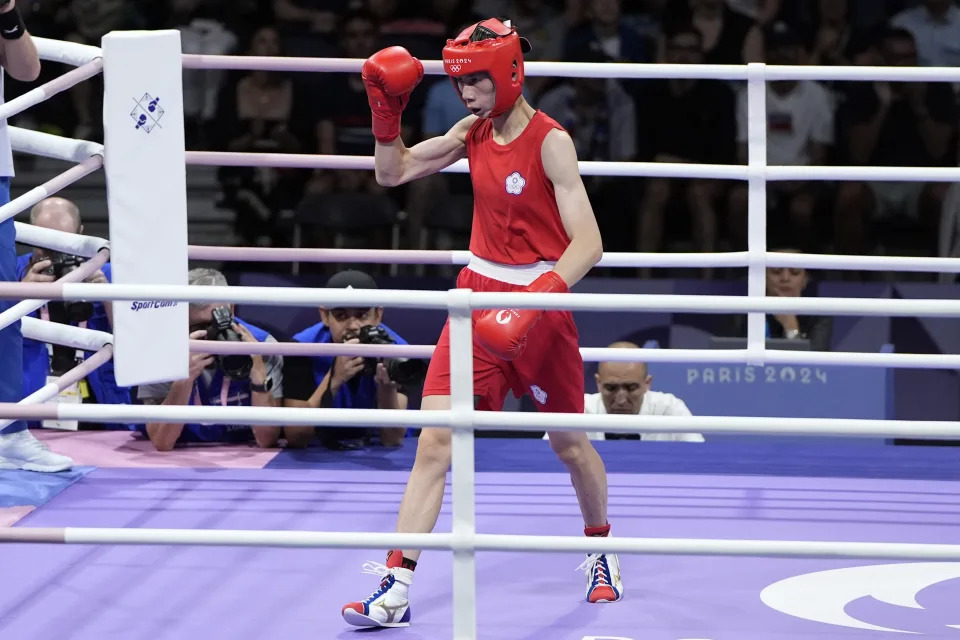

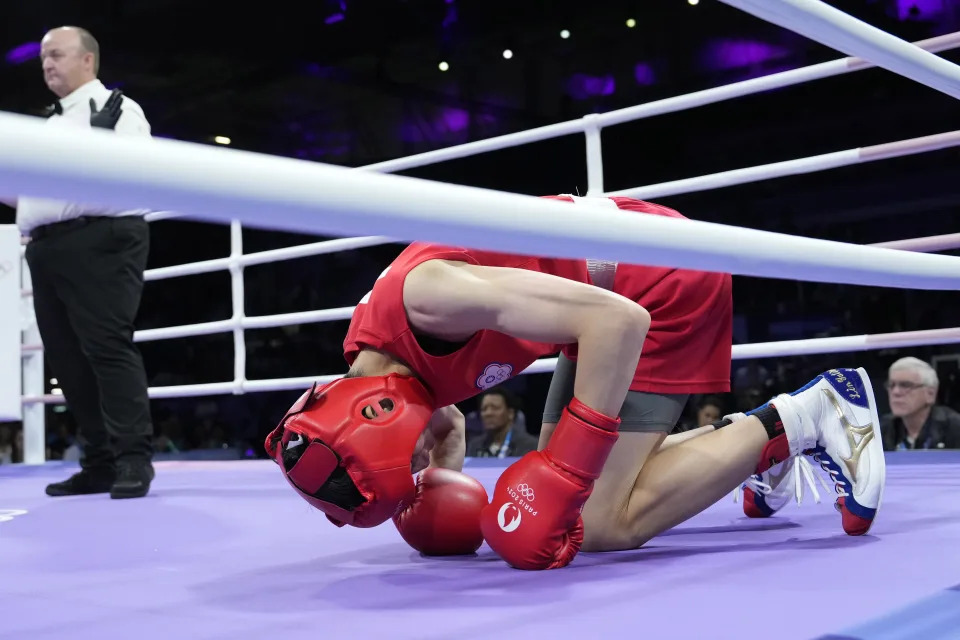
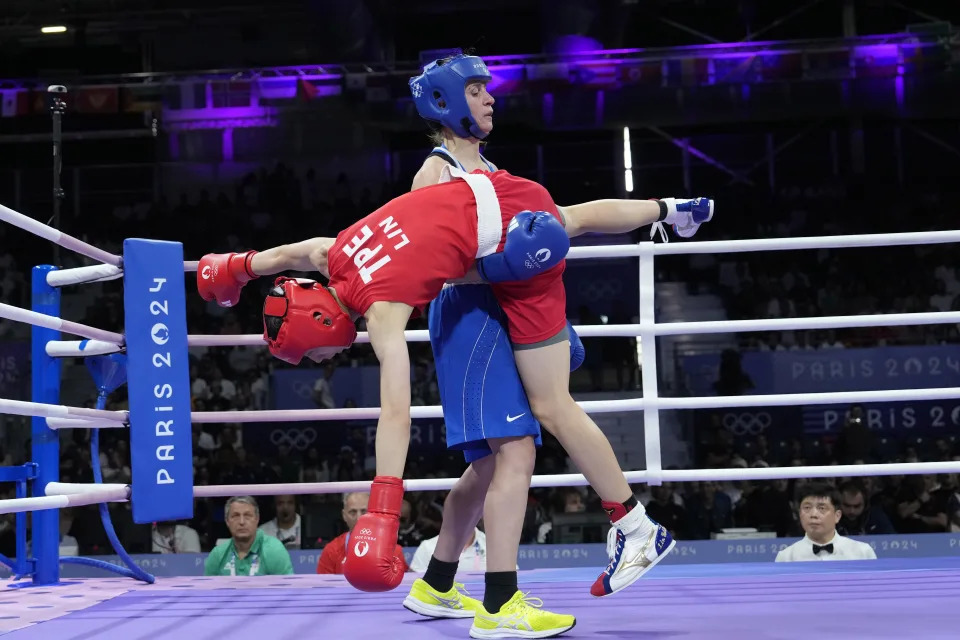
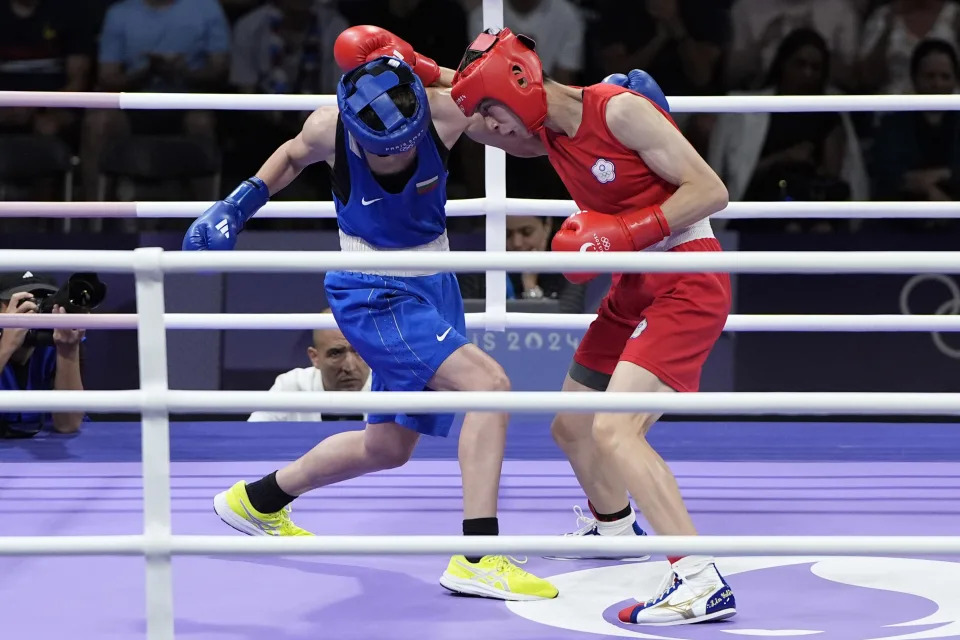
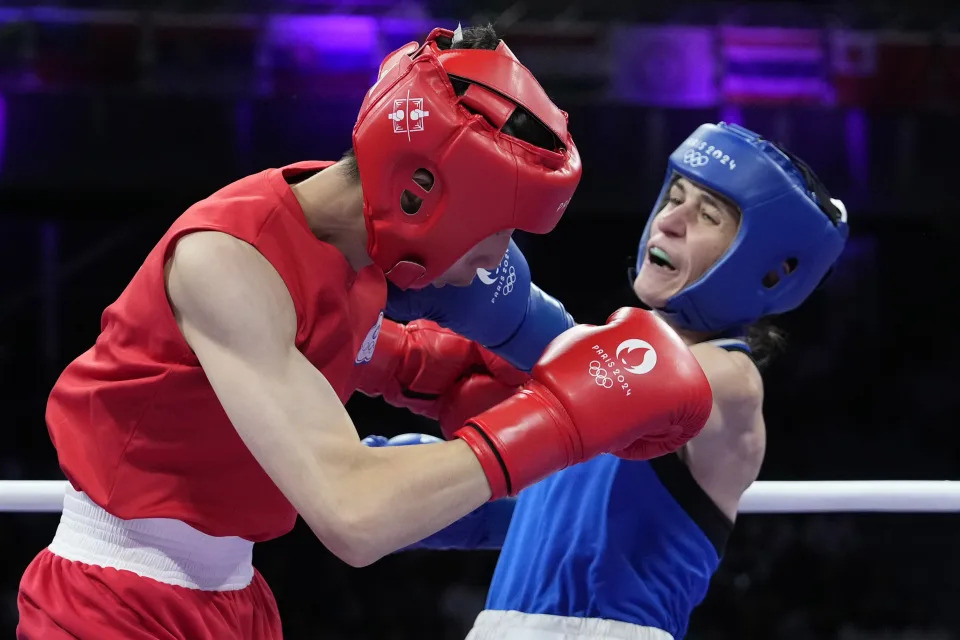
Taiwan's Lin Yu-ting motions between rounds against Bulgaria's Svetlana Staneva in their women's 57 kg quarterfinal boxing match at the 2024 Summer Olympics, Sunday, Aug. 4, 2024, in Paris, France. (AP Photo/John Locher)
VILLEPINTE, France (AP) — Boxer Lin Yu-ting of Taiwan clinched her first Olympic medal Sunday in front of a crowd that chanted her name, one day after fellow boxer Imane Khelif of Algeria secured one as well following days of online abuse and intense scrutiny about their participation at the Paris Games.
Lin defeated Svetlana Kamenova Staneva of Bulgaria 5:0 in a women's 57-kilogram quarterfinal, advancing to the semifinals and ensuring she will win at least a bronze medal.
Lin and Khelif have been at the center of a clash over gender identity and regulations in sports, as critics have brought up their disqualification from the world championships last year after the banned International Boxing Association claimed they failed unspecified eligibility tests for women's competition.
Lin, who will face Esra Yildiz Kahraman of Turkey at Roland-Garros on Wednesday, said her goal is to keep going and become a gold medalist. She did not mention any of the online scrutiny of the past few days and said that she shut down her social media before her first Olympic fight.
“I want to thank all the supporters from Taiwan,” she said.
Staneva appeared to walk past Lin immediately after the fight, but after the referee announced the decision and lifted Lin's hand as the winner, Staneva went over and sat on the rope on her opponent's side and opened the rope for Lin to step out.
Staneva, a 34-year-old amateur boxing veteran, lost a close fight to Lin in the semifinals of the 2023 world championships in India. The victory was changed to a no contest by the IBA, which claimed Lin had failed the unspecified eligibility test.
The IBA has been banned from Olympic participation since 2019 following years of criticism from the International Olympic Committee, including concerns over its administration of competitions and financial transparency. The IBA has declined to disclose any details about its tests, calling the information confidential.
The IOC has condemned what it called “hate speech” toward the boxers, and spokesman Mark Adams again defended them Sunday, strongly criticizing the IBA testing process that singled them out because “there were suspicions against them."
“The whole process is flawed,” Adams said. “From the conception of the test, to how the test was shared with us, to how the tests have become public, is so flawed that it’s impossible to engage with it.”
Both Lin and Khelif have drawn support from their countries amid the outcry, which has included comments from former U.S. President Donald Trump, “Harry Potter” writer J.K. Rowling and others making false claims about them being men or transgender.
Khelif was showered with cheers throughout her emotional win over Anna Luca Hamori of Hungary on Saturday night. Many supporters at North Paris Arena were wrapped in Algerian flags and screaming her name. She wiped away tears when it was over and wept as she exited the arena.
Lin bowed to the crowd before and after Sunday's bout, looking up at cheering supporters before embracing her coaches and exiting the ring.
She also got support from former Taiwanese President Tsai Ing-wen on social media Friday when Lin beat Sitora Turdibekova of Uzbekistan 5:0 in her first fight.
“When I met boxer Lin Yu-ting, I saw an athlete who is fearless in the face of challenges, whether they come from inside or outside the ring,” Tsai wrote. “Today, when she represents Taiwan on the Olympic stage, we will be behind her & all the Taiwanese Olympians making us proud.”
Lin is competing in her second Olympics but did not win a medal in Tokyo in 2021. She's a two-time world champion with the IBA (2018 and 2022). She’s competed in elite-level amateur boxing for a decade. Neither Lin nor Khelif, who’s 25 and a six-year veteran, had been sanctioned before last year’s world championships.
“There’s a whole range of reasons why we won’t deal with this,” Adams of IOC said of the testing. “Partly confidentiality. Partly medical issues. Partly that there was no basis for the test in the first place. And partly data-sharing of this is also highly against the rules, international rules.”
___
IOC calls tests that sparked vitriol targeting boxers Imane Khelif and Lin Yu-Ting impossibly flawed
JOHN LEICESTER
Updated Sun, August 4, 2024
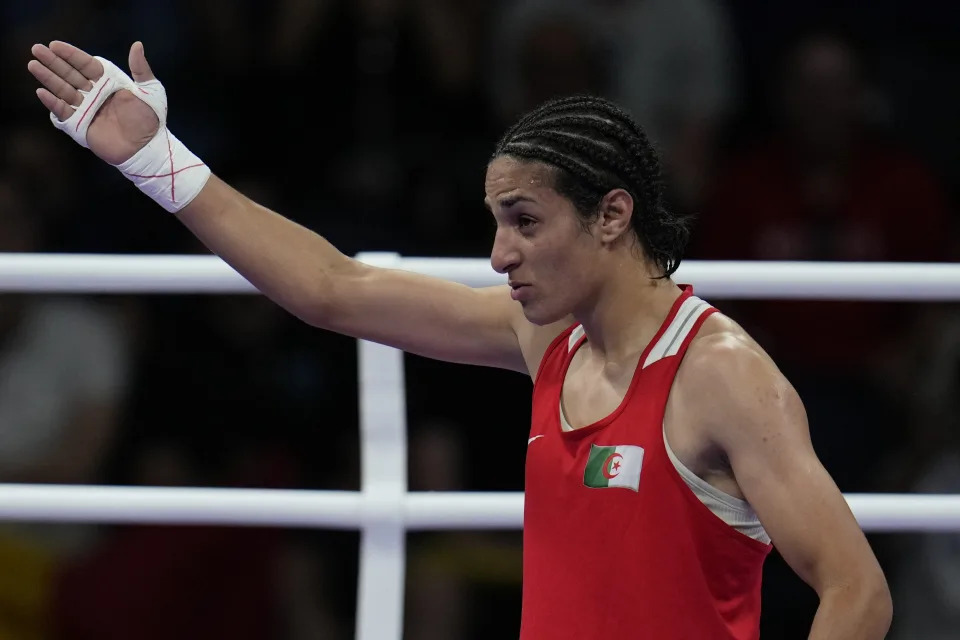

Taiwan's Lin Yu-ting celebrates after defeating Bulgaria's Svetlana Staneva in their women's 57 kg quarterfinal boxing match at the 2024 Summer Olympics, Sunday, Aug. 4, 2024, in Paris, France. (AP Photo/Ariana Cubillos)
PARIS (AP) — Olympics organizers said Sunday that arbitrary testing imposed on boxers Imane Khelif and Lin Yu-Ting that led to a storm of vitriol misidentifying the women as transgender or men was “so flawed that it's impossible to engage with it.”
International Olympic Committee spokesman Mark Adams again vigorously defended Khelif of Algeria and Lin of Taiwan, hammering the sport's now-banned governing body, the International Boxing Association, that claimed the fighters failed unspecified eligibility tests for women's competition.
The two athletes were "carted off and tested" during the 2023 boxing world championships because “there were suspicions against them,” Adams said, slamming the process that singled them out.
“I need hardly say if we start acting on suspicions against every athlete of whatever, then we go down a very bad route," he said.
He rejected the testing in its entirety.
“There’s a whole range of reasons why we won't deal with this," Adams said. "Partly confidentiality. Partly medical issues. Partly that there was no basis for the test in the first place. And partly data-sharing of this is also highly against the rules, international rules.”
“The whole process is flawed,” Adams added. “From the conception of the test, to how the test was shared with us, to how the tests have become public, is so flawed that it’s impossible to engage with it.”
Lin and Khelif have been at the center of a clash over gender identity and regulations in sports as critics have brought up their disqualification last year. The IBA claimed they failed “to meet the required necessary eligibility criteria and were found to have competitive advantages over other female competitors.”
The Russian-dominated governing body was given the unprecedented punishment of being permanently banned from the Olympics last year and has not run an Olympic boxing tournament since the Rio de Janeiro Games in 2016.
Adams confirmed that the IOC received a letter from the IBA that the 3 Wire Sports website reported concerned Khelif and Lin and, it said, was sent in June of last year to Olympic organizers.
Adams wouldn't discuss the letter's contents but reiterated: “Those tests are not legitimate."
“There was indeed a letter,” he said. ”I’m not going to discuss the individual intimate details of athletes, in public, which I think is pretty disgraceful for those who have leaked that material. Frankly, to be put in that position must be awful. On top of all of the social media harassment that these these athletes have had."
IOC President Thomas Bach had sought Saturday to draw a line under days of global scrutiny about the female boxers and what he described as a politically motivated “cultural war.”
“We have two boxers who are born as women, who have been raised as women, who have a passport as a woman and have competed for many years as women,” Bach said. “Some want to own a definition of who is a women.”
Bach linked the furor to what he called a wider, Russian-led campaign against the IOC and the Paris Olympics, where only 15 Russian athletes are competing as neutrals. The IOC and international sports bodies have isolated Russia because of the country's invasion of Ukraine.
“What we have seen from the Russian side and in particular from the (IBA),” Bach said, “they have undertaken already way before these Games with a defamation campaign against France, against the Games, against the IOC.”
___
AP Olympics: https://apnews.com/hub/2024-paris-olympic-games
IOC first received Imane Khelif gender test report 14 months ago
Tom Morgan
Sun, August 4, 2024

Algeria's Imane Khelif swept into her boxing semi-final with victory over Hungary's Anna Hamori, despite previous IBA disqualifications for gender eligibility - AP/John Locher
BBC
Sun, August 4, 2024

Imane Khelif beat Angela Carini on Thursday [Getty Images]
Algeria's Imane Khelif and Taiwan's Lin Yu-ting have been cleared to compete at the Paris Olympics despite being disqualified from last year's World Championships after they were said to have failed gender eligibility tests.
Khelif, 25, is guaranteed at least a bronze medal after beating Hungarian Luca Anna Hamori in Saturday's welterweight quarter-final.
Lin competes in the featherweight quarter-final on Sunday after victory over Uzbekistan's Sitora Turdibekova.
Their participation in the Games has proved controversial given their disqualifications in 2023.
Earlier this week Khelif's first bout was abandoned after 46 seconds by Italian opponent Angela Carini.
This led to some criticising the International Olympic Committee (IOC) for allowing the entry of a boxer who it is said previously failed to meet gender eligibility criteria.
Italian Carini said she ended the fight to "preserve her life", but apologised to her Algerian opponent on Friday, saying "if the IOC said she can fight, I respect that decision".
Khelif, speaking after her victory, said: "I'm here for the gold - I fight everybody."
Lin won her first fight at Paris 2024 on Friday - the 28-year-old entering the arena to cheers and some boos - before beating Turdibekova in the 57kg category.
The International Boxing Association (IBA), which was the previous organiser of Olympic boxing, has been a vocal critic of the IOC's decision to permit the two athletes to compete.
Here BBC Sport takes you through some of the key questions around the topic.
What sex were Khelif and Lin assigned at birth? Were they born biologically male or female?
Khelif has always competed in the women's division and is recognised by the IOC as a female athlete.
"The Algerian boxer was born female, was registered female, lived her life as a female, boxed as a female, has a female passport," IOC spokesperson Mark Adams said on Friday.
"This is not a transgender case. There has been some confusion that somehow it's a man fighting a woman. This is just not the case. On that there is consensus, scientifically this is not a man fighting a woman."
Khelif has spoken about her experience of growing up as a girl in Algeria and the prejudice she faced playing football alongside boys.
"Don't let obstacles come in your way, resist any obstacles and overcome them," she said in March 2024. "My dream is to win a gold medal.
"If I win, mothers and fathers can see how far their children can go. I particularly want to inspire girls and children who are disadvantaged in Algeria."
There is no suggestion Khelif identifies as anything other than a woman.
Lin has also always competed in the women's division and is recognised by the IOC as a female athlete.
Khelif being in women's boxing not fair, says next opponent
I want to apologise to Khelif - Italian boxer Carini
Lin wins controversial first bout at Paris Olympics
What are their boxing careers to date?
Khelif has been boxing for eight years.
The Algerian made her debut on the world amateur stage at 19, when she came 17th at the 2018 World Championships. A year later, Khelif came 19th in the 2019 Women's World Boxing Championships.
She made her Olympic debut at the 2020 Games in Tokyo. Fighting in the 60kg lightweight division, Khelif was beaten 5-0 at the quarter-final stage by Ireland's eventual gold medallist Kellie Harrington.
She then became the first Algerian boxer to win a World Championship medal, taking silver in 2022 after losing the final to Ireland's Amy Broadhurst, who now represents Britain. Khelif followed that by winning the 2022 African Championships and 2022 Mediterranean Games.
In 2023, she won gold at the Arab Games in the 66kg division and earned her place in the 2024 Games by beating Mozambique's Alcinda Panguana in the final of the African Olympics qualification tournament in Senegal.
To date, Khelif has fought 50 times in her career, winning 41 and losing nine. Six of those victories have come via knockout.
Lin began boxing as a 13-year-old in 2008 and has enjoyed a successful career since making her debut at the elite level in 2017.
She is a two-time world champion - in 2018 and 2022 - and won bronze in 2019.
She is also a two-time Asian champion (2017 and 2019), and a two-time Asian Games medallist - winning gold in 2023 and bronze in 2018.
Lin made her Olympic debut at Tokyo 2020, losing in the last 16 of the featherweight category to Nesthy Petecio.
Of her 58 bouts, she has won 44 and lost 14. She has one victory by knockout.
Why was Khelif's win against Carini controversial?
Khelif's victory attracted controversy after Carini conceded in just 46 seconds.
Much of the criticism from some people stems from Khelif's disqualification at the 2023 World Championships in New Delhi, India.
She failed a gender eligibility test conducted by the IBA hours before her gold-medal showdown against China's Yang Liu. The Algerian initially appealed against the decision to the Court of Arbitration of Sport (Cas), but withdrew her appeal during the process, the IBA said.
The Russian-led IBA said Khelif "failed to meet the eligibility criteria for participating in the women's competition, as set and laid out in the IBA regulations".
According to the IBA's regulations: "Boxers will compete against boxers of the same gender, meaning women vs women and men vs men as per the definitions of these rules.
The IBA defines a woman, female or girl as "an individual with chromosome XX" and men, males or boys as "an individual with chromosome XY".
The IBA denied Khelif's testosterone levels had been tested.
In an interview with BBC sports editor Dan Roan on Thursday, IBA chief executive Chris Roberts said XY chromosomes were found in "both cases".
Roberts said there were "different strands involved in that" and therefore the body could not commit to referring to Khelif as "biologically male".
He said the unspecified eligibility tests had been conducted as a result of “ongoing concerns” raised by other fighters, coaches and the IBA’s medical committee.
The IOC has raised doubts over the accuracy of the tests.
"We don't know what the protocol was, we don't know whether the test was accurate, we don't know whether we should believe the test," said IOC spokesperson Adams.
"There's a difference between a test taking place and whether we accept the accuracy or even the protocol of the test."
The BBC has, as yet, been unable to determine what the eligibility tests consisted of.
Speaking on Saturday, Yacine Arab, the sport manager of the Algeria National Olympic Committee, was asked by BBC sports editor Dan Roan why Khelif had failed the IBA test.
He said: "We don't know. They said she was positive and her testosterone is very very high.
"Then the medical president of the IOC said that it's really normal in boxing that the athletes' testosterone is high. For all the girls it is the same. Imane is not alone in this case."
What happened with Lin at the 2023 World Championships?
At the same 2023 World Championships, Lin was stripped of a bronze medal by the IBA.
The IOC said on its media information portal earlier this week that she had failed to meet "eligibility requirements based on the results of a biochemical test".
It added: "It was the first time a Chinese Taipei athlete had been required to take a biochemical test for gender eligibility since the IBA started to use the new testing method."
The IOC removed this information from its portal later in the week.
In a statement on Thursday, the IOC said instead that Khelif and Lin had been "victims of a sudden and arbitrary decision by the IBA".
"Towards the end of the IBA World Championships in 2023, they were suddenly disqualified without any due process," the IOC said.
"According to the IBA minutes available on their website, this decision was initially taken solely by the IBA secretary general and CEO. The IBA board only ratified it afterwards and only subsequently requested that a procedure to follow in similar cases in the future be established and reflected in the IBA Regulations. The minutes also say that the IBA should 'establish a clear procedure on gender testing'.
"The current aggression against these two athletes is based entirely on this arbitrary decision, which was taken without any proper procedure - especially considering that these athletes had been competing in top-level competition for many years.
"Such an approach is contrary to good governance."
The IBA insisted its decision was "necessary to uphold the level of fairness and utmost integrity of the competition".
It said in a statement earlier this week: "The athletes did not undergo a testosterone examination but were subject to a separate and recognised test, whereby the specifics remain confidential. This test conclusively indicated that both athletes did not meet the required necessary eligibility criteria and were found to have competitive advantages over other female competitors."
The IBA said Lin did not appeal against the IBA's decision to Cas, "thus rendering the decision legally binding".
Some reports in Taiwan in 2023 suggested Lin's test failure was due to "weight control and menstrual cycle" medication that affected hormonal levels.
What has changed in Olympic boxing regulation and governance since the IBA's decision?
Unlike previous Games, boxing at the Tokyo Olympics was organised by the IOC rather than the IBA.
The IOC suspended the IBA in 2019 because of concerns over its finances, governance, ethics, refereeing and judging.
Having failed to meet required reforms set out by the IOC, the IBA was stripped of its status as the sport's world governing body in 2023. That decision was upheld in April 2024 by Cas following an appeal.
The IOC's decision to strip the IBA of its status came four months after the body disqualified Khelif and Lin from the World Championships.
In 2021, the IOC released a framework on 'Fairness, Inclusion and Non-Discrimination on the Basis of Gender Identity and Sex Variations'.
The document sets out 10 principles - not rules - for national bodies to follow when selecting athletes for the Games.
The IOC said it "supports the participation of any athlete who has qualified and met the eligibility criteria to compete in the Olympic Games as established by their IF (International Federation). The IOC will not discriminate against an athlete who has qualified through their IF (International Federation), on the basis of their gender identity and/or sex characteristics."
What testing is conducted in boxing?
In 2019, the IOC delegated responsibility for the organisation and management of doping control at the Olympics to the International Testing Agency (ITA).
The IOC said it took a "zero-tolerance policy" to anyone found using or providing doping products.
Tests include, but are not excluded to, determining an athlete's levels of testosterone.
"There are many women with higher levels of testosterone than men," said IOC spokesperson Adams.
"So the idea that a testosterone test is a magic bullet is actually not true."
Is this a transgender debate?
No.
There is no suggestion that Khelif or Lin identify as transgender.
Some reports have taken the IBA statement that the boxers have XY chromosomes to speculate they might have differences of sexual development (DSD) like runner Caster Semenya.
However, the BBC has not been able to confirm whether this is or is not the case.
On Saturday, IOC president Thomas Bach told a news conference this was not a "DSD case" - but later issued a correction.
He had told journalists at the IOC daily briefing: "We are not talking about the transgender issue here. This is about a woman taking part in a women's competition.
"I repeat, this is not a DSD case."
The IOC later posted a correction on social media saying Bach did not mean to say it was "not a DSD case", he was meant to say "this is a not a transgender case".
In posting their correction they did not give any further details on whether this is a DSD case.
After Khelif's fight on Saturday, Algeria Olympic Committee sport manager Arab was asked if she was a DSD athlete.
"When she arrived at the village she did this test," he added. "Do you think if she was positive they would let her fight? Never. She did all the tests – even the tests for pregnancy. All the tests were negative.
"Today the IOC president sent a message to the sporting world that this [situation] is a joke.
"Imane was born a girl, she fights as a girl and she is a girl. I told Imane the IOC sent this message and she's very happy."
DSD is a group of rare conditions, whereby a person's hormones, genes and/or reproductive organs may be a mix of male and female characteristics.
Some of those affected prefer the term "intersex", which is an umbrella term used to describe people who are born with biological variations in their sex characteristics that don't fit typical male or female categories.
Other sports have rules in place for athletes with DSD, whose elevated testosterone levels can lead to increased muscle mass and strength.
World Athletics, for example, only allows athletes with DSD to compete in female track events if they reduce their testosterone levels.
When do Khelif and Lin next fight?
Lin faces Bulgarian Svetlana Kamenova Staneva - the featherweight European champion - in the quarter-final on Sunday at 10:00 BST.
Khelif takes on Thailand's Janjaem Suwannapheng in Tuesday's welterweight semi-final.
What have people said?
"It matters to be able to compete on equal grounds and, from my point of view, it was not an even contest," - Italian Prime Minister Giorgia Meloni.
"She has been condemned by a test no-one has seen and it has become an established fact. Everything else is pure and utter down to invention. I think it has hurt Olympic boxing at a crucial time where its future is still being discussed. It's an absolute disaster," Steve Bunce, 5 Live commentator
"If you've got one boxer who far outweighs the strength of another based against eligibility criteria and testing, that would suggest that that person is not fit to be within the female category of the competition," Chris Roberts, CEO of IBA
"I would urge we try to take the culture war out of this and actually address the issues and the people and think about the people concerned and the real damage that is being done by misinformation," Mark Adams, IOC spokesperson.
"It was an incredibly uncomfortable watch for the 46 seconds that it lasted and I know there is a lot of concern about women competitors about whether we are getting the balance right in not just in boxing but other sports as well," Lisa Nandy, Secretary of State for Culture, Media and Sport.
ALANIS THAMES
Updated Sun, August 4, 2024






Taiwan's Lin Yu-ting motions between rounds against Bulgaria's Svetlana Staneva in their women's 57 kg quarterfinal boxing match at the 2024 Summer Olympics, Sunday, Aug. 4, 2024, in Paris, France. (AP Photo/John Locher)
VILLEPINTE, France (AP) — Boxer Lin Yu-ting of Taiwan clinched her first Olympic medal Sunday in front of a crowd that chanted her name, one day after fellow boxer Imane Khelif of Algeria secured one as well following days of online abuse and intense scrutiny about their participation at the Paris Games.
Lin defeated Svetlana Kamenova Staneva of Bulgaria 5:0 in a women's 57-kilogram quarterfinal, advancing to the semifinals and ensuring she will win at least a bronze medal.
Lin and Khelif have been at the center of a clash over gender identity and regulations in sports, as critics have brought up their disqualification from the world championships last year after the banned International Boxing Association claimed they failed unspecified eligibility tests for women's competition.
Lin, who will face Esra Yildiz Kahraman of Turkey at Roland-Garros on Wednesday, said her goal is to keep going and become a gold medalist. She did not mention any of the online scrutiny of the past few days and said that she shut down her social media before her first Olympic fight.
“I want to thank all the supporters from Taiwan,” she said.
Staneva appeared to walk past Lin immediately after the fight, but after the referee announced the decision and lifted Lin's hand as the winner, Staneva went over and sat on the rope on her opponent's side and opened the rope for Lin to step out.
Staneva, a 34-year-old amateur boxing veteran, lost a close fight to Lin in the semifinals of the 2023 world championships in India. The victory was changed to a no contest by the IBA, which claimed Lin had failed the unspecified eligibility test.
The IBA has been banned from Olympic participation since 2019 following years of criticism from the International Olympic Committee, including concerns over its administration of competitions and financial transparency. The IBA has declined to disclose any details about its tests, calling the information confidential.
The IOC has condemned what it called “hate speech” toward the boxers, and spokesman Mark Adams again defended them Sunday, strongly criticizing the IBA testing process that singled them out because “there were suspicions against them."
“The whole process is flawed,” Adams said. “From the conception of the test, to how the test was shared with us, to how the tests have become public, is so flawed that it’s impossible to engage with it.”
Both Lin and Khelif have drawn support from their countries amid the outcry, which has included comments from former U.S. President Donald Trump, “Harry Potter” writer J.K. Rowling and others making false claims about them being men or transgender.
Khelif was showered with cheers throughout her emotional win over Anna Luca Hamori of Hungary on Saturday night. Many supporters at North Paris Arena were wrapped in Algerian flags and screaming her name. She wiped away tears when it was over and wept as she exited the arena.
Lin bowed to the crowd before and after Sunday's bout, looking up at cheering supporters before embracing her coaches and exiting the ring.
She also got support from former Taiwanese President Tsai Ing-wen on social media Friday when Lin beat Sitora Turdibekova of Uzbekistan 5:0 in her first fight.
“When I met boxer Lin Yu-ting, I saw an athlete who is fearless in the face of challenges, whether they come from inside or outside the ring,” Tsai wrote. “Today, when she represents Taiwan on the Olympic stage, we will be behind her & all the Taiwanese Olympians making us proud.”
Lin is competing in her second Olympics but did not win a medal in Tokyo in 2021. She's a two-time world champion with the IBA (2018 and 2022). She’s competed in elite-level amateur boxing for a decade. Neither Lin nor Khelif, who’s 25 and a six-year veteran, had been sanctioned before last year’s world championships.
“There’s a whole range of reasons why we won’t deal with this,” Adams of IOC said of the testing. “Partly confidentiality. Partly medical issues. Partly that there was no basis for the test in the first place. And partly data-sharing of this is also highly against the rules, international rules.”
___
IOC calls tests that sparked vitriol targeting boxers Imane Khelif and Lin Yu-Ting impossibly flawed
JOHN LEICESTER
Updated Sun, August 4, 2024


Taiwan's Lin Yu-ting celebrates after defeating Bulgaria's Svetlana Staneva in their women's 57 kg quarterfinal boxing match at the 2024 Summer Olympics, Sunday, Aug. 4, 2024, in Paris, France. (AP Photo/Ariana Cubillos)
PARIS (AP) — Olympics organizers said Sunday that arbitrary testing imposed on boxers Imane Khelif and Lin Yu-Ting that led to a storm of vitriol misidentifying the women as transgender or men was “so flawed that it's impossible to engage with it.”
International Olympic Committee spokesman Mark Adams again vigorously defended Khelif of Algeria and Lin of Taiwan, hammering the sport's now-banned governing body, the International Boxing Association, that claimed the fighters failed unspecified eligibility tests for women's competition.
The two athletes were "carted off and tested" during the 2023 boxing world championships because “there were suspicions against them,” Adams said, slamming the process that singled them out.
“I need hardly say if we start acting on suspicions against every athlete of whatever, then we go down a very bad route," he said.
He rejected the testing in its entirety.
“There’s a whole range of reasons why we won't deal with this," Adams said. "Partly confidentiality. Partly medical issues. Partly that there was no basis for the test in the first place. And partly data-sharing of this is also highly against the rules, international rules.”
“The whole process is flawed,” Adams added. “From the conception of the test, to how the test was shared with us, to how the tests have become public, is so flawed that it’s impossible to engage with it.”
Lin and Khelif have been at the center of a clash over gender identity and regulations in sports as critics have brought up their disqualification last year. The IBA claimed they failed “to meet the required necessary eligibility criteria and were found to have competitive advantages over other female competitors.”
The Russian-dominated governing body was given the unprecedented punishment of being permanently banned from the Olympics last year and has not run an Olympic boxing tournament since the Rio de Janeiro Games in 2016.
Adams confirmed that the IOC received a letter from the IBA that the 3 Wire Sports website reported concerned Khelif and Lin and, it said, was sent in June of last year to Olympic organizers.
Adams wouldn't discuss the letter's contents but reiterated: “Those tests are not legitimate."
“There was indeed a letter,” he said. ”I’m not going to discuss the individual intimate details of athletes, in public, which I think is pretty disgraceful for those who have leaked that material. Frankly, to be put in that position must be awful. On top of all of the social media harassment that these these athletes have had."
IOC President Thomas Bach had sought Saturday to draw a line under days of global scrutiny about the female boxers and what he described as a politically motivated “cultural war.”
“We have two boxers who are born as women, who have been raised as women, who have a passport as a woman and have competed for many years as women,” Bach said. “Some want to own a definition of who is a women.”
Bach linked the furor to what he called a wider, Russian-led campaign against the IOC and the Paris Olympics, where only 15 Russian athletes are competing as neutrals. The IOC and international sports bodies have isolated Russia because of the country's invasion of Ukraine.
“What we have seen from the Russian side and in particular from the (IBA),” Bach said, “they have undertaken already way before these Games with a defamation campaign against France, against the Games, against the IOC.”
___
AP Olympics: https://apnews.com/hub/2024-paris-olympic-games
IOC first received Imane Khelif gender test report 14 months ago
Tom Morgan
Sun, August 4, 2024

Algeria's Imane Khelif swept into her boxing semi-final with victory over Hungary's Anna Hamori, despite previous IBA disqualifications for gender eligibility - AP/John Locher
The International Olympic Committee was warned in writing more than a year ago that Olympic women’s boxer Imane Khelif had the DNA of a “male”.
Mark Adams, spokesman for the IOC, confirmed the existence of the International Boxing Association (IBA) letter, leaked to the 3 Wire Sports website on Sunday.
Khelif and Lin Yu-ting have been at the centre of a storm, sweeping into their boxing semi-finals despite previous IBA disqualifications for gender eligibility.
However, it has now emerged that the IBA – which has been repeatedly criticised by the IOC – told the Olympics in June last year of its test results on Khelif.
One test in India last year and a prior test in Turkey in May 2022 “concluded the boxer’s DNA was that of a male consisting of XY chromosomes,” the IBA correspondence in June 2023 said.
‘Tests are not legitimate’
On Sunday, the IOC confirmed receiving a letter from the IBA last year, and did not dispute the contents of it during multiple questions at the daily press conference. However, the body insisted that the tests should be regarded as illegitimate as they were conducted on an ad-hoc basis in the middle of last year’s World Championship.
“First off, it won’t surprise you to know I’m going to repeat the line that those tests are not legitimate tests,” said Adams.
“So there was indeed a letter. I can confirm that. But the tests themselves, the process of the tests, the ad hoc nature of the tests are not legitimate. And you will also expect me to tell you that I’m not going to discuss the individual intimate details of athletes in public, which I think is pretty disgraceful for those who have leaked that material, frankly. To be put in that position must be awful. On top of all of the social media harassment that these athletes have had.”
Adams was speaking as Taiwan’s Lin faced protests from her opponent as she was guaranteed a medal at the Paris Olympics.
As Lin swept into her semi-final just as easily as Imane Khelif had done the night before, losing Bulgarian opponent Svetlana Staneva pulled off her gloves, pointed to herself and made a double tap X symbol with her fingers. The Bulgarian’s coach had also been holding a white piece of paper with the words “I only want to play with women I am XX” scrawled on it.
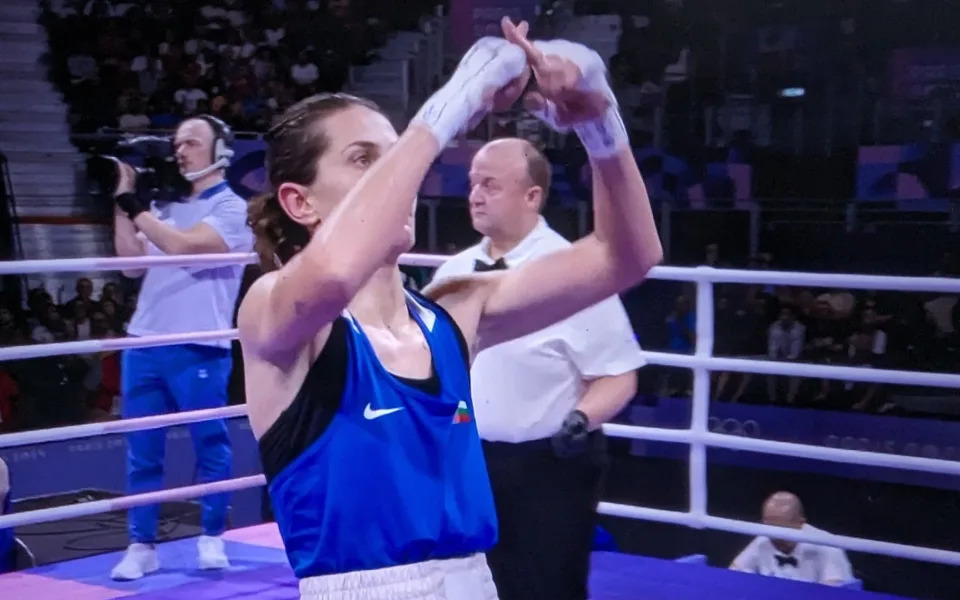
After losing to Lin Yu Ting, Bulgaria's Svetlana Staneva rejected a handshake and made a double tap 'X' gesture to the crowd - X/@jreichelt
Fairness-for-sport campaigners have been outraged by fights in recent days, with both boxers easing past their opponents.
But IOC president Thomas Bach and his spokesman Adams have poured scorn on the IBA for allegedly fuelling the flames around the furore. The IOC and the IBA organisations have been at war since 2019, when the IBA was suspended as the body leading Olympic boxing.
On Saturday, the IBA announced it would award prize money to Angela Carini, whose fight against Khelif was ended in 46 seconds, “as if she were an Olympic champion”.
Adams said that the IBA, run by Moscow-born administrator Umar Kremlev, has “no credibility”. The IBA was stripped of its status as boxing’s world governing body last year. That decision came four months after the body disqualified Khelif and Lin from the 2023 World Championships. Kremlev last year described the IOC leadership as “prostitutes in sports who get involved in politics”.
Dispute between IOC and IBA intensifies
The IOC’s war with the IBA is likely to escalate on Monday as the boxing body is hosting a press conference in Paris to set out its evidence.
Adams, however, indicated he sees “no reason for the test” that took place to decide the two boxers’ gender last year. “The test was as far as we can see taken arbitrarily,” he said.
“The decision which I’ve seen reported is also related to the competition where one of the boxers beat a Russian boxer, and I don’t know if there’s any truth in it. I know that the boxer did beat a Russian but the very fact that the decision to do the testing was taken on the spot there. Under what purpose the test was for, I don’t know. We managed to do away with sex testing in the last century.”
He acknowledged there was an “ongoing debate” around protections for women’s sport “not just in boxing”, but “nobody wants to go back to the days of sex testing”.
The IOC-IBA dispute is at the centre of an existential threat facing boxing at LA 2028. Mike McAtee, USA Boxing’s executive director, is among the IBA’s fiercest critics. He suggested to the Washington Post that Kremlev would ultimately like to see “Olympic-style boxing fail”. Instead it is World Boxing, which McAtee helped to form, which the IOC hopes will one day run Olympic boxing.
Last Monday, when Telegraph Sport was among the first outlets to report on the two cases, the two IBA disqualifications were reported openly in footnotes on the Paris 2024 official biographies. By Friday morning, however, those IBA tests had vanished in the two athlete profiles, replaced by a link to the latest lengthy IOC statement.
Boxing controversy - what we know and what we don't
Mark Adams, spokesman for the IOC, confirmed the existence of the International Boxing Association (IBA) letter, leaked to the 3 Wire Sports website on Sunday.
Khelif and Lin Yu-ting have been at the centre of a storm, sweeping into their boxing semi-finals despite previous IBA disqualifications for gender eligibility.
However, it has now emerged that the IBA – which has been repeatedly criticised by the IOC – told the Olympics in June last year of its test results on Khelif.
One test in India last year and a prior test in Turkey in May 2022 “concluded the boxer’s DNA was that of a male consisting of XY chromosomes,” the IBA correspondence in June 2023 said.
‘Tests are not legitimate’
On Sunday, the IOC confirmed receiving a letter from the IBA last year, and did not dispute the contents of it during multiple questions at the daily press conference. However, the body insisted that the tests should be regarded as illegitimate as they were conducted on an ad-hoc basis in the middle of last year’s World Championship.
“First off, it won’t surprise you to know I’m going to repeat the line that those tests are not legitimate tests,” said Adams.
“So there was indeed a letter. I can confirm that. But the tests themselves, the process of the tests, the ad hoc nature of the tests are not legitimate. And you will also expect me to tell you that I’m not going to discuss the individual intimate details of athletes in public, which I think is pretty disgraceful for those who have leaked that material, frankly. To be put in that position must be awful. On top of all of the social media harassment that these athletes have had.”
Adams was speaking as Taiwan’s Lin faced protests from her opponent as she was guaranteed a medal at the Paris Olympics.
As Lin swept into her semi-final just as easily as Imane Khelif had done the night before, losing Bulgarian opponent Svetlana Staneva pulled off her gloves, pointed to herself and made a double tap X symbol with her fingers. The Bulgarian’s coach had also been holding a white piece of paper with the words “I only want to play with women I am XX” scrawled on it.

After losing to Lin Yu Ting, Bulgaria's Svetlana Staneva rejected a handshake and made a double tap 'X' gesture to the crowd - X/@jreichelt
Fairness-for-sport campaigners have been outraged by fights in recent days, with both boxers easing past their opponents.
But IOC president Thomas Bach and his spokesman Adams have poured scorn on the IBA for allegedly fuelling the flames around the furore. The IOC and the IBA organisations have been at war since 2019, when the IBA was suspended as the body leading Olympic boxing.
On Saturday, the IBA announced it would award prize money to Angela Carini, whose fight against Khelif was ended in 46 seconds, “as if she were an Olympic champion”.
Adams said that the IBA, run by Moscow-born administrator Umar Kremlev, has “no credibility”. The IBA was stripped of its status as boxing’s world governing body last year. That decision came four months after the body disqualified Khelif and Lin from the 2023 World Championships. Kremlev last year described the IOC leadership as “prostitutes in sports who get involved in politics”.
Dispute between IOC and IBA intensifies
The IOC’s war with the IBA is likely to escalate on Monday as the boxing body is hosting a press conference in Paris to set out its evidence.
Adams, however, indicated he sees “no reason for the test” that took place to decide the two boxers’ gender last year. “The test was as far as we can see taken arbitrarily,” he said.
“The decision which I’ve seen reported is also related to the competition where one of the boxers beat a Russian boxer, and I don’t know if there’s any truth in it. I know that the boxer did beat a Russian but the very fact that the decision to do the testing was taken on the spot there. Under what purpose the test was for, I don’t know. We managed to do away with sex testing in the last century.”
He acknowledged there was an “ongoing debate” around protections for women’s sport “not just in boxing”, but “nobody wants to go back to the days of sex testing”.
The IOC-IBA dispute is at the centre of an existential threat facing boxing at LA 2028. Mike McAtee, USA Boxing’s executive director, is among the IBA’s fiercest critics. He suggested to the Washington Post that Kremlev would ultimately like to see “Olympic-style boxing fail”. Instead it is World Boxing, which McAtee helped to form, which the IOC hopes will one day run Olympic boxing.
Last Monday, when Telegraph Sport was among the first outlets to report on the two cases, the two IBA disqualifications were reported openly in footnotes on the Paris 2024 official biographies. By Friday morning, however, those IBA tests had vanished in the two athlete profiles, replaced by a link to the latest lengthy IOC statement.
Boxing controversy - what we know and what we don't
BBC
Sun, August 4, 2024

Imane Khelif beat Angela Carini on Thursday [Getty Images]
Algeria's Imane Khelif and Taiwan's Lin Yu-ting have been cleared to compete at the Paris Olympics despite being disqualified from last year's World Championships after they were said to have failed gender eligibility tests.
Khelif, 25, is guaranteed at least a bronze medal after beating Hungarian Luca Anna Hamori in Saturday's welterweight quarter-final.
Lin competes in the featherweight quarter-final on Sunday after victory over Uzbekistan's Sitora Turdibekova.
Their participation in the Games has proved controversial given their disqualifications in 2023.
Earlier this week Khelif's first bout was abandoned after 46 seconds by Italian opponent Angela Carini.
This led to some criticising the International Olympic Committee (IOC) for allowing the entry of a boxer who it is said previously failed to meet gender eligibility criteria.
Italian Carini said she ended the fight to "preserve her life", but apologised to her Algerian opponent on Friday, saying "if the IOC said she can fight, I respect that decision".
Khelif, speaking after her victory, said: "I'm here for the gold - I fight everybody."
Lin won her first fight at Paris 2024 on Friday - the 28-year-old entering the arena to cheers and some boos - before beating Turdibekova in the 57kg category.
The International Boxing Association (IBA), which was the previous organiser of Olympic boxing, has been a vocal critic of the IOC's decision to permit the two athletes to compete.
Here BBC Sport takes you through some of the key questions around the topic.
What sex were Khelif and Lin assigned at birth? Were they born biologically male or female?
Khelif has always competed in the women's division and is recognised by the IOC as a female athlete.
"The Algerian boxer was born female, was registered female, lived her life as a female, boxed as a female, has a female passport," IOC spokesperson Mark Adams said on Friday.
"This is not a transgender case. There has been some confusion that somehow it's a man fighting a woman. This is just not the case. On that there is consensus, scientifically this is not a man fighting a woman."
Khelif has spoken about her experience of growing up as a girl in Algeria and the prejudice she faced playing football alongside boys.
"Don't let obstacles come in your way, resist any obstacles and overcome them," she said in March 2024. "My dream is to win a gold medal.
"If I win, mothers and fathers can see how far their children can go. I particularly want to inspire girls and children who are disadvantaged in Algeria."
There is no suggestion Khelif identifies as anything other than a woman.
Lin has also always competed in the women's division and is recognised by the IOC as a female athlete.
Khelif being in women's boxing not fair, says next opponent
I want to apologise to Khelif - Italian boxer Carini
Lin wins controversial first bout at Paris Olympics
What are their boxing careers to date?
Khelif has been boxing for eight years.
The Algerian made her debut on the world amateur stage at 19, when she came 17th at the 2018 World Championships. A year later, Khelif came 19th in the 2019 Women's World Boxing Championships.
She made her Olympic debut at the 2020 Games in Tokyo. Fighting in the 60kg lightweight division, Khelif was beaten 5-0 at the quarter-final stage by Ireland's eventual gold medallist Kellie Harrington.
She then became the first Algerian boxer to win a World Championship medal, taking silver in 2022 after losing the final to Ireland's Amy Broadhurst, who now represents Britain. Khelif followed that by winning the 2022 African Championships and 2022 Mediterranean Games.
In 2023, she won gold at the Arab Games in the 66kg division and earned her place in the 2024 Games by beating Mozambique's Alcinda Panguana in the final of the African Olympics qualification tournament in Senegal.
To date, Khelif has fought 50 times in her career, winning 41 and losing nine. Six of those victories have come via knockout.
Lin began boxing as a 13-year-old in 2008 and has enjoyed a successful career since making her debut at the elite level in 2017.
She is a two-time world champion - in 2018 and 2022 - and won bronze in 2019.
She is also a two-time Asian champion (2017 and 2019), and a two-time Asian Games medallist - winning gold in 2023 and bronze in 2018.
Lin made her Olympic debut at Tokyo 2020, losing in the last 16 of the featherweight category to Nesthy Petecio.
Of her 58 bouts, she has won 44 and lost 14. She has one victory by knockout.
Why was Khelif's win against Carini controversial?
Khelif's victory attracted controversy after Carini conceded in just 46 seconds.
Much of the criticism from some people stems from Khelif's disqualification at the 2023 World Championships in New Delhi, India.
She failed a gender eligibility test conducted by the IBA hours before her gold-medal showdown against China's Yang Liu. The Algerian initially appealed against the decision to the Court of Arbitration of Sport (Cas), but withdrew her appeal during the process, the IBA said.
The Russian-led IBA said Khelif "failed to meet the eligibility criteria for participating in the women's competition, as set and laid out in the IBA regulations".
According to the IBA's regulations: "Boxers will compete against boxers of the same gender, meaning women vs women and men vs men as per the definitions of these rules.
The IBA defines a woman, female or girl as "an individual with chromosome XX" and men, males or boys as "an individual with chromosome XY".
The IBA denied Khelif's testosterone levels had been tested.
In an interview with BBC sports editor Dan Roan on Thursday, IBA chief executive Chris Roberts said XY chromosomes were found in "both cases".
Roberts said there were "different strands involved in that" and therefore the body could not commit to referring to Khelif as "biologically male".
He said the unspecified eligibility tests had been conducted as a result of “ongoing concerns” raised by other fighters, coaches and the IBA’s medical committee.
The IOC has raised doubts over the accuracy of the tests.
"We don't know what the protocol was, we don't know whether the test was accurate, we don't know whether we should believe the test," said IOC spokesperson Adams.
"There's a difference between a test taking place and whether we accept the accuracy or even the protocol of the test."
The BBC has, as yet, been unable to determine what the eligibility tests consisted of.
Speaking on Saturday, Yacine Arab, the sport manager of the Algeria National Olympic Committee, was asked by BBC sports editor Dan Roan why Khelif had failed the IBA test.
He said: "We don't know. They said she was positive and her testosterone is very very high.
"Then the medical president of the IOC said that it's really normal in boxing that the athletes' testosterone is high. For all the girls it is the same. Imane is not alone in this case."
What happened with Lin at the 2023 World Championships?
At the same 2023 World Championships, Lin was stripped of a bronze medal by the IBA.
The IOC said on its media information portal earlier this week that she had failed to meet "eligibility requirements based on the results of a biochemical test".
It added: "It was the first time a Chinese Taipei athlete had been required to take a biochemical test for gender eligibility since the IBA started to use the new testing method."
The IOC removed this information from its portal later in the week.
In a statement on Thursday, the IOC said instead that Khelif and Lin had been "victims of a sudden and arbitrary decision by the IBA".
"Towards the end of the IBA World Championships in 2023, they were suddenly disqualified without any due process," the IOC said.
"According to the IBA minutes available on their website, this decision was initially taken solely by the IBA secretary general and CEO. The IBA board only ratified it afterwards and only subsequently requested that a procedure to follow in similar cases in the future be established and reflected in the IBA Regulations. The minutes also say that the IBA should 'establish a clear procedure on gender testing'.
"The current aggression against these two athletes is based entirely on this arbitrary decision, which was taken without any proper procedure - especially considering that these athletes had been competing in top-level competition for many years.
"Such an approach is contrary to good governance."
The IBA insisted its decision was "necessary to uphold the level of fairness and utmost integrity of the competition".
It said in a statement earlier this week: "The athletes did not undergo a testosterone examination but were subject to a separate and recognised test, whereby the specifics remain confidential. This test conclusively indicated that both athletes did not meet the required necessary eligibility criteria and were found to have competitive advantages over other female competitors."
The IBA said Lin did not appeal against the IBA's decision to Cas, "thus rendering the decision legally binding".
Some reports in Taiwan in 2023 suggested Lin's test failure was due to "weight control and menstrual cycle" medication that affected hormonal levels.
What has changed in Olympic boxing regulation and governance since the IBA's decision?
Unlike previous Games, boxing at the Tokyo Olympics was organised by the IOC rather than the IBA.
The IOC suspended the IBA in 2019 because of concerns over its finances, governance, ethics, refereeing and judging.
Having failed to meet required reforms set out by the IOC, the IBA was stripped of its status as the sport's world governing body in 2023. That decision was upheld in April 2024 by Cas following an appeal.
The IOC's decision to strip the IBA of its status came four months after the body disqualified Khelif and Lin from the World Championships.
In 2021, the IOC released a framework on 'Fairness, Inclusion and Non-Discrimination on the Basis of Gender Identity and Sex Variations'.
The document sets out 10 principles - not rules - for national bodies to follow when selecting athletes for the Games.
The IOC said it "supports the participation of any athlete who has qualified and met the eligibility criteria to compete in the Olympic Games as established by their IF (International Federation). The IOC will not discriminate against an athlete who has qualified through their IF (International Federation), on the basis of their gender identity and/or sex characteristics."
What testing is conducted in boxing?
In 2019, the IOC delegated responsibility for the organisation and management of doping control at the Olympics to the International Testing Agency (ITA).
The IOC said it took a "zero-tolerance policy" to anyone found using or providing doping products.
Tests include, but are not excluded to, determining an athlete's levels of testosterone.
"There are many women with higher levels of testosterone than men," said IOC spokesperson Adams.
"So the idea that a testosterone test is a magic bullet is actually not true."
Is this a transgender debate?
No.
There is no suggestion that Khelif or Lin identify as transgender.
Some reports have taken the IBA statement that the boxers have XY chromosomes to speculate they might have differences of sexual development (DSD) like runner Caster Semenya.
However, the BBC has not been able to confirm whether this is or is not the case.
On Saturday, IOC president Thomas Bach told a news conference this was not a "DSD case" - but later issued a correction.
He had told journalists at the IOC daily briefing: "We are not talking about the transgender issue here. This is about a woman taking part in a women's competition.
"I repeat, this is not a DSD case."
The IOC later posted a correction on social media saying Bach did not mean to say it was "not a DSD case", he was meant to say "this is a not a transgender case".
In posting their correction they did not give any further details on whether this is a DSD case.
After Khelif's fight on Saturday, Algeria Olympic Committee sport manager Arab was asked if she was a DSD athlete.
"When she arrived at the village she did this test," he added. "Do you think if she was positive they would let her fight? Never. She did all the tests – even the tests for pregnancy. All the tests were negative.
"Today the IOC president sent a message to the sporting world that this [situation] is a joke.
"Imane was born a girl, she fights as a girl and she is a girl. I told Imane the IOC sent this message and she's very happy."
DSD is a group of rare conditions, whereby a person's hormones, genes and/or reproductive organs may be a mix of male and female characteristics.
Some of those affected prefer the term "intersex", which is an umbrella term used to describe people who are born with biological variations in their sex characteristics that don't fit typical male or female categories.
Other sports have rules in place for athletes with DSD, whose elevated testosterone levels can lead to increased muscle mass and strength.
World Athletics, for example, only allows athletes with DSD to compete in female track events if they reduce their testosterone levels.
When do Khelif and Lin next fight?
Lin faces Bulgarian Svetlana Kamenova Staneva - the featherweight European champion - in the quarter-final on Sunday at 10:00 BST.
Khelif takes on Thailand's Janjaem Suwannapheng in Tuesday's welterweight semi-final.
What have people said?
"It matters to be able to compete on equal grounds and, from my point of view, it was not an even contest," - Italian Prime Minister Giorgia Meloni.
"She has been condemned by a test no-one has seen and it has become an established fact. Everything else is pure and utter down to invention. I think it has hurt Olympic boxing at a crucial time where its future is still being discussed. It's an absolute disaster," Steve Bunce, 5 Live commentator
"If you've got one boxer who far outweighs the strength of another based against eligibility criteria and testing, that would suggest that that person is not fit to be within the female category of the competition," Chris Roberts, CEO of IBA
"I would urge we try to take the culture war out of this and actually address the issues and the people and think about the people concerned and the real damage that is being done by misinformation," Mark Adams, IOC spokesperson.
"It was an incredibly uncomfortable watch for the 46 seconds that it lasted and I know there is a lot of concern about women competitors about whether we are getting the balance right in not just in boxing but other sports as well," Lisa Nandy, Secretary of State for Culture, Media and Sport.
Koh Ewe
Sat, August 3, 2024
The gloves are off in Taiwan, where government officials and citizens alike are furiously denouncing J.K. Rowling, after the Harry Potter author weighed in on the culture war overshadowing Olympic boxing.
Local politicians and journalists are taking jabs at Rowling, some Harry Potter fans have vowed to boycott her products, and social media users have defended Lin Yu Ting, the 28-year-old Chinese Taipei women’s boxer who has found herself at the center of a raging debate about biology and sports.
Read More: What to Know About the Gender Fight in Olympic Boxing
As boxing events kicked off at the Olympics in Paris this week, the eligibility of Taiwan’s Lin as well as Algeria’s Imane Khelif has been questioned by critics claiming that they are men pretending to be women for competitive advantage. (Both have identified as women since birth, and both have competed and lost to women in international boxing events, including previous Olympics.)
Among the most prominent voices crying unfair is Rowling, who achieved massive renown for her Harry Potter series but has in recent years become known for her outspokenness on transgender issues—a turn that has alienated both her fans and the franchise’s biggest stars.
Sharing an article by the Guardian about the controversy surrounding Lin and Khelif, Rowling posted on X earlier this week: “What will it take to end this insanity? A female boxer left with life-altering injuries? A female boxer killed?”
“It’s one thing to criticize transgender issues, but our Lin Yu Ting is completely not transgender!” reads a post on X on Wednesday by national newspaper The Liberty Times. “If J.K. Rowling can’t even tell the difference in this, this editor suggests she focuses on writing novels!”
And an article on Wednesday in Taiwanese newspaper United Daily News described the ongoing Olympic boxing debate as a “mistaken transgender controversy” that “even J.K. Rowling has misunderstood.” Similar headlines and TV news reports have proliferated.
Taiwanese officials, media, and members of the public have emphasized that Lin is and has always been considered female. Others’ doubt, however, stems from a decision by the International Boxing Association (IBA) last year to disqualify her and Khelif from the World Championships, claiming that they failed an unspecified eligibility test that determined they have XY chromosomes (the pair typically associated with males).
Read More: The Nazi-Era Myth Behind Olympics Gender-Testing Rules
The IBA, which is led by Russia, was stripped of its authority over Olympic boxing events because of long-standing concerns about integrity and governance, and the International Olympic Committee (IOC) has repeatedly declared that Lin and Khelif are eligible to continue competing as women.
“These two athletes were the victims of a sudden and arbitrary decision by the IBA … without any due process,” the IOC said in a statement on Thursday. “Every person has the right to practice sport without discrimination.”
But critics, including Rowling, have not thrown in the towel on the debate, instead doubling down on their opposition to the participation of athletes like Lin and Khelif, and decrying the “brutal injustice” to Italian boxer Angela Carini, who abandoned her preliminary fight against Khelif on Thursday.

Algeria’s Imane Khelif (red) and Italy’s Angela Carini (blue) at the women’s 66-kg preliminary round match of the Olympic Games in Paris, France, on Aug. 1, 2024 in Paris.Fabio Bozzani—Anadolu/Getty Images
Now, Taiwanese Harry Potter fans are disavowing their love for the creator of their favorite fantasy series. “J.K. Rowling is suspecting Taiwan’s Olympian for competing as a transgender, I shall boycott all Harry Potter merchandise and movies,” one fan declared on a Harry Potter fan site in a post that was met with many comments voicing similar disappointment in Rowling’s remarks.
“This is so shocking and disappointing to me, and I believe to everyone else in Fairyland,” reads one comment, referencing the name of the fan site. “Rowling is no longer my favorite author,” said more than one commenter. “Even though I love Harry Potter, I no longer like Rowling.”
Taiwanese social media users are also pulling no punches in defense of Lin.
“Even J.K. Rowling is joining in on the heckling, claiming that she’s speaking for women but is in fact maligning an innocent person,” a Taipei-based user posted on X, urging greater support for Lin, who is “completely female and has a sad story.” (Lin said when she was in middle school that she took up boxing at age 13 to try to protect her mother from domestic abuse.)
“It’s horrific that J.K. Rowling, who’s wielding her reputation and always uses crazy tactics, totally doesn’t care that she might be wrong, and is desperately smearing our athlete,” reads another popular post on X by a doctor aimed at dispelling doubts about Lin’s gender.
“Let’s not even talk about the fact that J.K. Rowling’s opinions and stance on transgender issues in recent years have been very controversial. I’ll say just one thing: identity card number,” Keelung City Councillor Jiho Tiun wrote on Facebook, referring to Taiwanese citizens’ national identification numbers that begin with 1 for males and 2 for females and are rarely altered.
“If she was biologically male and went to change her gender to get better results in competition, then her identity card would have begun with 1 instead of 2. Because no baby at birth would have schemed this way just to take part in the Olympics 28 years later,” Tiun continued. “This may make sense for a novelist specializing in writing about magic and wizardry. But in Taiwan, registering your identity and gender after birth is something that can’t be simpler.”
New Taipei City Councilor Cho Kuan-ting similarly emphasized that Lin was born female and urged the public to show their solidarity with her. “Everyone please support our national Olympic athlete Lin Yu Ting,” he wrote in a Facebook post. “The worst is the fact that writer J.K. Rowling, a key opinion leader, is publicly questioning the Taiwanese athlete’s gender.”
Taiwanese President Lai Ching-te’s spokesperson said Thursday in a post on X that Lin “has shown incredible strength, overcoming doubts to compete fairly on the world stage. Your determination inspires the nation!”
Meanwhile, former President Tsai Ing-wen, voiced her support for Lin on Friday. “Lin Yu Ting is going to play tonight, seeking to advance, fighting for victory for herself, and fighting for honor for Taiwan,” she wrote in a Facebook post. “Faced with disturbances and her opponents’ challenge outside of the ring, I believe Lin is not afraid.”
“The Yu Ting I know is a gentle and strong athlete. I believe that the disturbances off the court will not affect her!” Su wrote on Facebook.
“On Yu Ting’s competition eligibility being questioned by a British boxer and British writer, of course I can understand that athletes have their opinions about their interests,” director-general of Taiwan’s sports administration Cheng Shih-Chung told reporters on Thursday, in apparent reference to Rowling and other critics that have included some current and former boxers around the world. “But after all, they don’t know the whole story,” he said, adding that criticisms of Lin may be a psychological tactic to throw off the Taiwanese boxer.
Lin, for her part, is rolling with the punches, telling reporters in Paris that her emotions have not been affected by the controversy. “I can definitely interpret these challenges as opponents being so afraid of our ability, that they’re making an issue out of some problems,” she said. “The more they fear me, the better I’ll perform in the boxing ring.”
Contact us at letters@time.com.
Bach defends Khelif and Lin competing in Olympics
Sat, August 3, 2024
The gloves are off in Taiwan, where government officials and citizens alike are furiously denouncing J.K. Rowling, after the Harry Potter author weighed in on the culture war overshadowing Olympic boxing.
Local politicians and journalists are taking jabs at Rowling, some Harry Potter fans have vowed to boycott her products, and social media users have defended Lin Yu Ting, the 28-year-old Chinese Taipei women’s boxer who has found herself at the center of a raging debate about biology and sports.
Read More: What to Know About the Gender Fight in Olympic Boxing
As boxing events kicked off at the Olympics in Paris this week, the eligibility of Taiwan’s Lin as well as Algeria’s Imane Khelif has been questioned by critics claiming that they are men pretending to be women for competitive advantage. (Both have identified as women since birth, and both have competed and lost to women in international boxing events, including previous Olympics.)
Among the most prominent voices crying unfair is Rowling, who achieved massive renown for her Harry Potter series but has in recent years become known for her outspokenness on transgender issues—a turn that has alienated both her fans and the franchise’s biggest stars.
Sharing an article by the Guardian about the controversy surrounding Lin and Khelif, Rowling posted on X earlier this week: “What will it take to end this insanity? A female boxer left with life-altering injuries? A female boxer killed?”
While Rowling’s previous comments on transgender issues have not made a significant mark in Taiwan, despite the self-ruled island being more progressive on LGBTQ rights than many of its neighbors in Asia, Taiwanese society has hit back with force at Rowling’s perceived attack on one of their own.
“It’s one thing to criticize transgender issues, but our Lin Yu Ting is completely not transgender!” reads a post on X on Wednesday by national newspaper The Liberty Times. “If J.K. Rowling can’t even tell the difference in this, this editor suggests she focuses on writing novels!”
And an article on Wednesday in Taiwanese newspaper United Daily News described the ongoing Olympic boxing debate as a “mistaken transgender controversy” that “even J.K. Rowling has misunderstood.” Similar headlines and TV news reports have proliferated.
Taiwanese officials, media, and members of the public have emphasized that Lin is and has always been considered female. Others’ doubt, however, stems from a decision by the International Boxing Association (IBA) last year to disqualify her and Khelif from the World Championships, claiming that they failed an unspecified eligibility test that determined they have XY chromosomes (the pair typically associated with males).
Read More: The Nazi-Era Myth Behind Olympics Gender-Testing Rules
The IBA, which is led by Russia, was stripped of its authority over Olympic boxing events because of long-standing concerns about integrity and governance, and the International Olympic Committee (IOC) has repeatedly declared that Lin and Khelif are eligible to continue competing as women.
“These two athletes were the victims of a sudden and arbitrary decision by the IBA … without any due process,” the IOC said in a statement on Thursday. “Every person has the right to practice sport without discrimination.”
But critics, including Rowling, have not thrown in the towel on the debate, instead doubling down on their opposition to the participation of athletes like Lin and Khelif, and decrying the “brutal injustice” to Italian boxer Angela Carini, who abandoned her preliminary fight against Khelif on Thursday.

Algeria’s Imane Khelif (red) and Italy’s Angela Carini (blue) at the women’s 66-kg preliminary round match of the Olympic Games in Paris, France, on Aug. 1, 2024 in Paris.Fabio Bozzani—Anadolu/Getty Images
Now, Taiwanese Harry Potter fans are disavowing their love for the creator of their favorite fantasy series. “J.K. Rowling is suspecting Taiwan’s Olympian for competing as a transgender, I shall boycott all Harry Potter merchandise and movies,” one fan declared on a Harry Potter fan site in a post that was met with many comments voicing similar disappointment in Rowling’s remarks.
“This is so shocking and disappointing to me, and I believe to everyone else in Fairyland,” reads one comment, referencing the name of the fan site. “Rowling is no longer my favorite author,” said more than one commenter. “Even though I love Harry Potter, I no longer like Rowling.”
Taiwanese social media users are also pulling no punches in defense of Lin.
“Even J.K. Rowling is joining in on the heckling, claiming that she’s speaking for women but is in fact maligning an innocent person,” a Taipei-based user posted on X, urging greater support for Lin, who is “completely female and has a sad story.” (Lin said when she was in middle school that she took up boxing at age 13 to try to protect her mother from domestic abuse.)
“It’s horrific that J.K. Rowling, who’s wielding her reputation and always uses crazy tactics, totally doesn’t care that she might be wrong, and is desperately smearing our athlete,” reads another popular post on X by a doctor aimed at dispelling doubts about Lin’s gender.
Politicians, many from the ruling Democratic Progressive Party, have come out swinging, too.
“Let’s not even talk about the fact that J.K. Rowling’s opinions and stance on transgender issues in recent years have been very controversial. I’ll say just one thing: identity card number,” Keelung City Councillor Jiho Tiun wrote on Facebook, referring to Taiwanese citizens’ national identification numbers that begin with 1 for males and 2 for females and are rarely altered.
“If she was biologically male and went to change her gender to get better results in competition, then her identity card would have begun with 1 instead of 2. Because no baby at birth would have schemed this way just to take part in the Olympics 28 years later,” Tiun continued. “This may make sense for a novelist specializing in writing about magic and wizardry. But in Taiwan, registering your identity and gender after birth is something that can’t be simpler.”
New Taipei City Councilor Cho Kuan-ting similarly emphasized that Lin was born female and urged the public to show their solidarity with her. “Everyone please support our national Olympic athlete Lin Yu Ting,” he wrote in a Facebook post. “The worst is the fact that writer J.K. Rowling, a key opinion leader, is publicly questioning the Taiwanese athlete’s gender.”
Taiwanese President Lai Ching-te’s spokesperson said Thursday in a post on X that Lin “has shown incredible strength, overcoming doubts to compete fairly on the world stage. Your determination inspires the nation!”
Meanwhile, former President Tsai Ing-wen, voiced her support for Lin on Friday. “Lin Yu Ting is going to play tonight, seeking to advance, fighting for victory for herself, and fighting for honor for Taiwan,” she wrote in a Facebook post. “Faced with disturbances and her opponents’ challenge outside of the ring, I believe Lin is not afraid.”
Lawmaker Su Chiao-hui, who has known Lin since 2017, also wished Lin good luck for her scheduled 57-kg round of 16 bout with Uzbekistan’s Sitora Turdibekova on Friday, describing Lin as “the pride of Taiwanese boxing.”
“The Yu Ting I know is a gentle and strong athlete. I believe that the disturbances off the court will not affect her!” Su wrote on Facebook.
“On Yu Ting’s competition eligibility being questioned by a British boxer and British writer, of course I can understand that athletes have their opinions about their interests,” director-general of Taiwan’s sports administration Cheng Shih-Chung told reporters on Thursday, in apparent reference to Rowling and other critics that have included some current and former boxers around the world. “But after all, they don’t know the whole story,” he said, adding that criticisms of Lin may be a psychological tactic to throw off the Taiwanese boxer.
Lin, for her part, is rolling with the punches, telling reporters in Paris that her emotions have not been affected by the controversy. “I can definitely interpret these challenges as opponents being so afraid of our ability, that they’re making an issue out of some problems,” she said. “The more they fear me, the better I’ll perform in the boxing ring.”
Contact us at letters@time.com.
Bach defends Khelif and Lin competing in Olympics
BBC
Sat, August 3, 2024

International Olympic Committee president Thomas Bach has defended boxers Imane Khelif and Lin Yu-ting competing at Paris 2024, saying there was "never any doubt" they are women.
The participation of Algeria's Khelif and Taiwan's Lin has proved controversial given they were disqualified from the 2023 World Championships.
The Russian-led International Boxing Association (IBA), which was the previous organiser of Olympic boxing, removed them from that competition after it claimed they had failed gender eligibility tests.
"Let's be very clear, we are talking about women's boxing," said Bach at Saturday's daily IOC briefing.
"We have two boxers who are born as a woman, who have been raised as a woman, who have a passport as a woman and who have competed for many years as a woman.
"This is the clear definition of a woman. There was never any doubt about them being a woman."
Boxing controversy - what we know and what we don't
Khelif being in women's boxing not fair, says next opponent
Both Khelif and Lin, who have always competed in the women's division and are recognised by the IOC as female athletes, have reached the quarter-finals of their respective weight categories.
Khelif, 25, beat Angela Carini in the first round of the welterweight competition as the Italian abandoned their bout after 46 seconds.
Carini said on Thursday she ended the fight to "preserve her life", but apologised to her opponent on Friday, saying "if the IOC said she can fight, I respect that decision".
Lin, 28, beat Uzbekistan's Sitora Turdibekova in the featherweight category on Friday.
Khelif faces Hungary's Anna Luca Hamori on Saturday, while Lin fights Svetlana Kamenova Staneva of Bulgaria on Sunday morning.
Both Hamori and Staneva have criticised having to face a boxer whose participation at the Olympics has been questioned.
The IBA has been a vocal critic of the IOC's decision to permit Khelif and Lin to compete, while the IOC has raised doubts over the accuracy of the IBA's tests.
"What we see now is that some want to own the definition of who is a woman," added Bach.
"There I can only invite them to come up with a scientific-based, new definition of who is a woman and how can somebody being born, raised, competed and having a passport as a woman cannot be considered a woman.
"If they are coming up with something, we are ready to listen, we are ready to look into it, but we will not take part in a sometimes politically-motivated, cultural war.
"Allow me to say that what is going on in this context in social media with all this hate speech, with this aggression and abuse fuelled by this agenda is totally unacceptable."
Imane's father, Omar Khelif, told Sky News: "My child is a girl."
He added: "She was raised as a girl. She's a strong girl. I raised her to be hard-working and brave. She has a strong will to work and to train.
"The Italian opponent she faced was unable to defeat my daughter because my daughter was stronger and she was softer."
Olympics: Algerian Boxer Imane Khelif Breaks Down in Tears After Winning Quarter-Final Match Against Opponent Who Posted Offensive Meme
Elsa Keslassy
Sat, August 3, 2024

Algerian boxer Imane Khelif broke down in tears after winning the 66 kg quarter-final boxing match against Hungary’s Anna Luca Hamori following an emotional past few days. Just this morning, Hamori posted a controversial now-deleted image on Instagram of a muscular horned monster facing off against a female boxer.
Khelif, who was welcomed in the ring like a rockstar by cheering supporters, has been targeted by persistent backlash online following her victory over Italy’s Angela Carini in a bout that lasted less than a minute.
More from Variety
'RuPaul's Drag Race' Star Nicky Doll Sues Laurence Fox Over Olympics Ceremony Remarks Calling Drag Performers 'Deviant Little Pedos'
Olympic Boxing Controversy Rages on Ahead of Imane Khelif's Next Bout: 'We Will Not Take Part in a Politically Motivated Cultural War'
French President Macron Condemns Harassment of Olympics Opening Ceremony Artistic Director: 'Nothing Justifies That an Artist Be Threatened'
One of Algeria’s first three Olympic women’s boxers sent to Tokyo three years ago, Khelif has faced some setbacks after being disqualified at last year’s Women’s World Championships, along with Taiwan’s Lin Yu‑ting, due to a gender eligibility test which reportedly revealed elevated levels of testosterone in their systems.
After Khelif won over Carini, she was accused to compete in the wrong gender category by several prominent figures such as J.K. Rowling who posted a picture from the fight on X saying: “Could any picture sum up our new men’s rights movement better?” She added that it showed the “smirk of a male who’s knows he’s protected by a misogynist sporting establishment enjoying the distress of a woman he’s just punched in the head, and whose life’s ambition he’s just shattered.” Elon Musk, meanwhile, shared a post from swimmer Riley Gaines that claimed “men don’t belong in women’s sports.” The X owner co-signed the message by writing: “Absolutely.”
But as Thomas Bach, the president of the International Olympic Commitee, reiterated today during a press briefing, Khelif was born and raised as a woman, has competed as such in the past, and is registered as a woman on her passport.
“We will not take part in a sometimes-politically motivated cultural war,” Bach added.
Carini, who abandoned her match against Khelif after declaring she “never felt a punch like this,” has expressed regrets over the way she behaved with the Algerian boxer right after the bout. She was quoted in the Italian sports outlet Gazzetta dello Sport saying she “(wanted to) apologize” for not shaking Khelif’s hand after the game. “Actually, I want to apologize to her and everyone else. I was angry because my Olympics had gone up in smoke,” she said, adding that “All this controversy makes me sad (…) I’m sorry for my opponent, too. If the IOC said she can fight, I respect that decision.”
Hamori looked shaken after the three-round match but saluted Khelif and nodded with somewhat of a smile. Earlier today, the Hungarian boxer was quoted saying she “(doesn’t) care about the stories, what is going on the social media right now. If she or he is a man, it will be a bigger victory for me if I win.”
Khelif will next face Thailand’s Janjaem Suwannapheng in the semi-final on Aug. 6.
kim hjelmgaard, usa today
Sat, Aug 3, 2024,
PARIS − International Olympic Committee President Thomas Bach said Saturday there's never been any doubt that two female boxers caught up in a gender-eligibility controversy at the Paris Olympics were women and he urged "really everyone to respect these women, to respect them as women, as human beings."
Bach was speaking in a press briefing with reporters as the Games passed their midway point and Olympic officials have had to repeatedly defend the inclusion of Algerian fighter Imane Khelif and Taiwan's Lin Yu-Ting.
Both athletes have faced intense public scrutiny, relentless media attention and an avalanche of abuse on social media platforms because they were allowed to compete in Paris despite being disqualified from last year’s world championships by the International Boxing Association (IBA) for failing to meet gender-eligibility criteria. But the IBA is no longer the sport's international governing body, and IOC spokesman Mark Adams said Saturday the IBA no longer had any "credibility" or "authority."
When the IBA disqualified Khelif and Lin it did so, it said, because of tests showing they displayed elevated levels of testosterone. However, the IOC and others have raised concerns about the veracity of those tests. The IOC is also not responsible for deciding who gets to compete in the Olympics, that's down to the sport's governing body.
Comments made online in recent days have inaccurately speculated about the sexes of Khelif and Lin. They are both cisgender women.
Imane Khelif: Meet the Algerian ensnared in Olympic boxing controversy
PARIS − International Olympic Committee President Thomas Bach said Saturday there's never been any doubt that two female boxers caught up in a gender-eligibility controversy at the Paris Olympics were women and he urged "really everyone to respect these women, to respect them as women, as human beings."
Bach was speaking in a press briefing with reporters as the Games passed their midway point and Olympic officials have had to repeatedly defend the inclusion of Algerian fighter Imane Khelif and Taiwan's Lin Yu-Ting.
Both athletes have faced intense public scrutiny, relentless media attention and an avalanche of abuse on social media platforms because they were allowed to compete in Paris despite being disqualified from last year’s world championships by the International Boxing Association (IBA) for failing to meet gender-eligibility criteria. But the IBA is no longer the sport's international governing body, and IOC spokesman Mark Adams said Saturday the IBA no longer had any "credibility" or "authority."
When the IBA disqualified Khelif and Lin it did so, it said, because of tests showing they displayed elevated levels of testosterone. However, the IOC and others have raised concerns about the veracity of those tests. The IOC is also not responsible for deciding who gets to compete in the Olympics, that's down to the sport's governing body.
Comments made online in recent days have inaccurately speculated about the sexes of Khelif and Lin. They are both cisgender women.
Imane Khelif: Meet the Algerian ensnared in Olympic boxing controversy

Algeria's Imane Khelif leaves after her women's 66kg preliminaries round of 16 boxing match against Italy's Angela Carini during the Paris Olympics.
"We are not talking about the transgender issue here," Bach said Saturday. "This is about a woman taking part in the women's category," he said, referring to Khelif, who has arguably drawn more critical attention than Lin because an Italian fighter named Angela Carini on Thursday abandoned her bout against Khelif after just 46 seconds.
"I have never felt a punch like this," Carini said later.
On Friday, Carini apologized for her comments. She also said she accepted her opponent's eligibility to fight as a woman. Still, the IBA injected fresh controversy into the debate Saturday by saying it would award Carini $50,000 despite abandoning her fight.
Bach noted that "many boxers tend to come from underprivileged parts of society." He said this was particularly true for women in countries where women's rights are not fully respected, such as Algeria.
"That is why it is more (deplorable) for what is happening with Imane (Khelif) on social media," he said, "because she has made it very clear many times she is standing there for the rights of the women in her country."



